Fast Crimes at Lambda School
Two days after his company's downfall, Austen Allred wrote:
I wish people could see how ugly it is to be envious, and how obvious it is to those around you when that's what's happening.
There's not much uglier than trying to tear someone down because they achieved what you wish you had.
Austen co-founded Lambda School, one of the largest educational startups of all time. It promised to teach you to code in a matter of months, a common claim in 2017, a time when code bootcamps were commodities you could find in any strip mall. But you don't score $120 million in funding from the biggest names in venture capital by building a better boot camp. He took on college.
An underdog with a story as fascinating as his company, Austen went from Mormon missionary to college dropout— at one point homeless and living out of his Honda Civic— to the founder of the hottest startup in the valley.
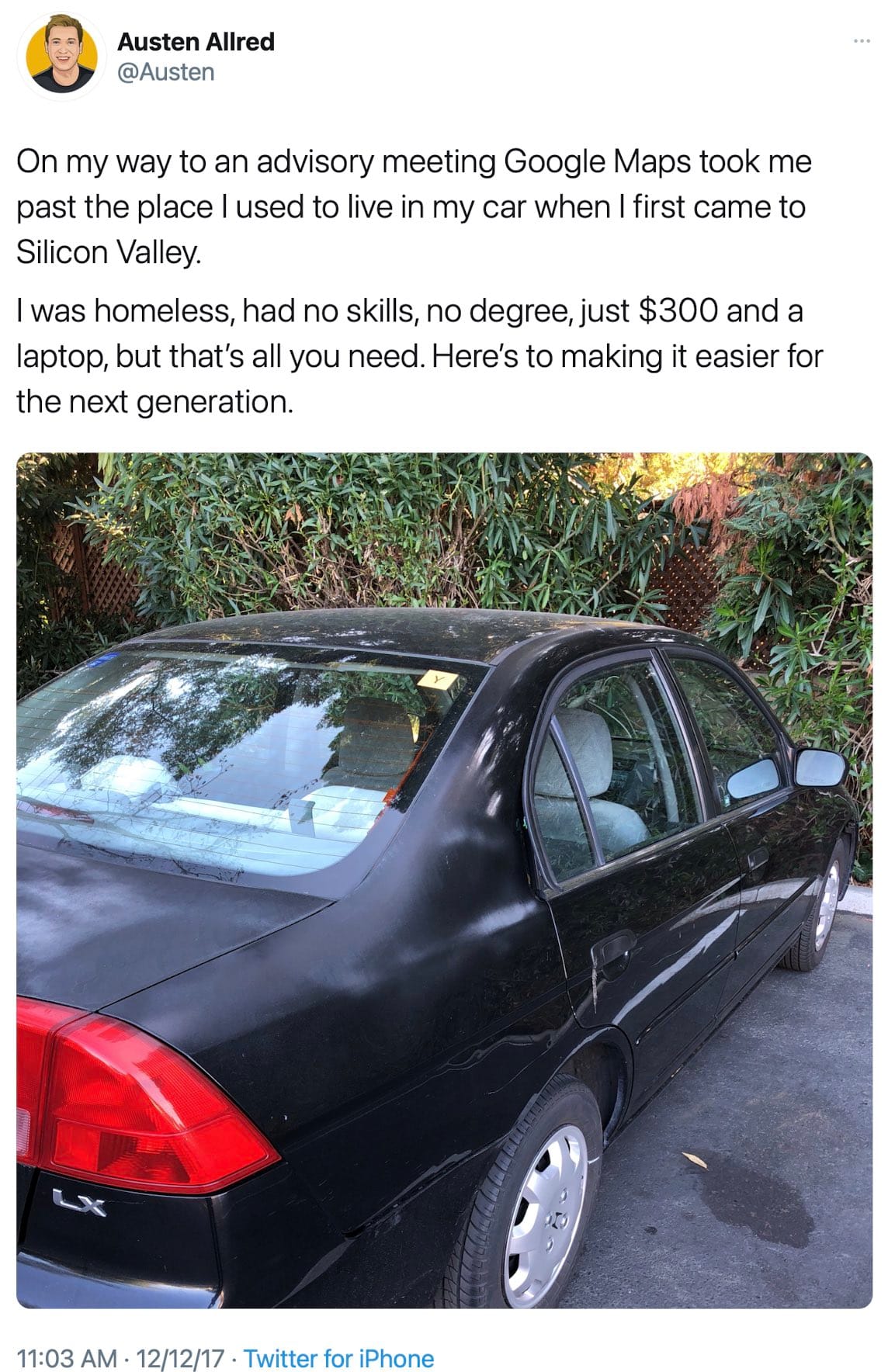
What set his boot camp apart from the others were "Income Share Agreements." Instead of paying up-front for tuition, students agreed to pay a portion of future income. If you don't get a job, you pay nothing. It was an idea so clever it became a breakout hit of Y Combinator, the same tech incubator that birthed Stripe, AirBnb, and countless other unicorns.
When Lambda School launched in 2017, critics likened ISAs to indentured servitude, but by 2019 it was Silicon Valley's golden child. Every day, Austen tweeted jaw-dropping results.
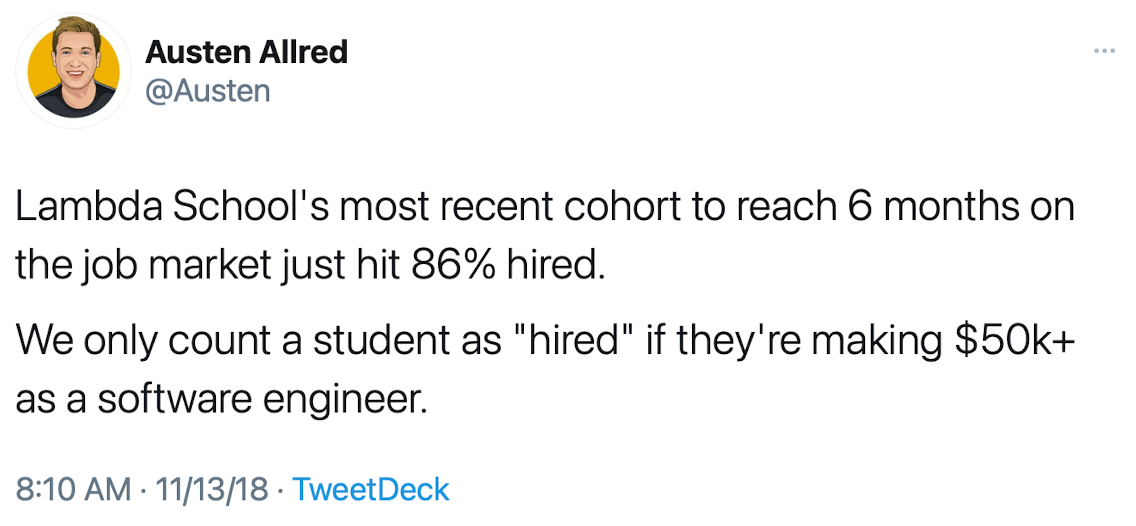
These results blew away other bootcamps, proved the power of "incentive alignment," and belonged on the front page of LambdaSchool.com.
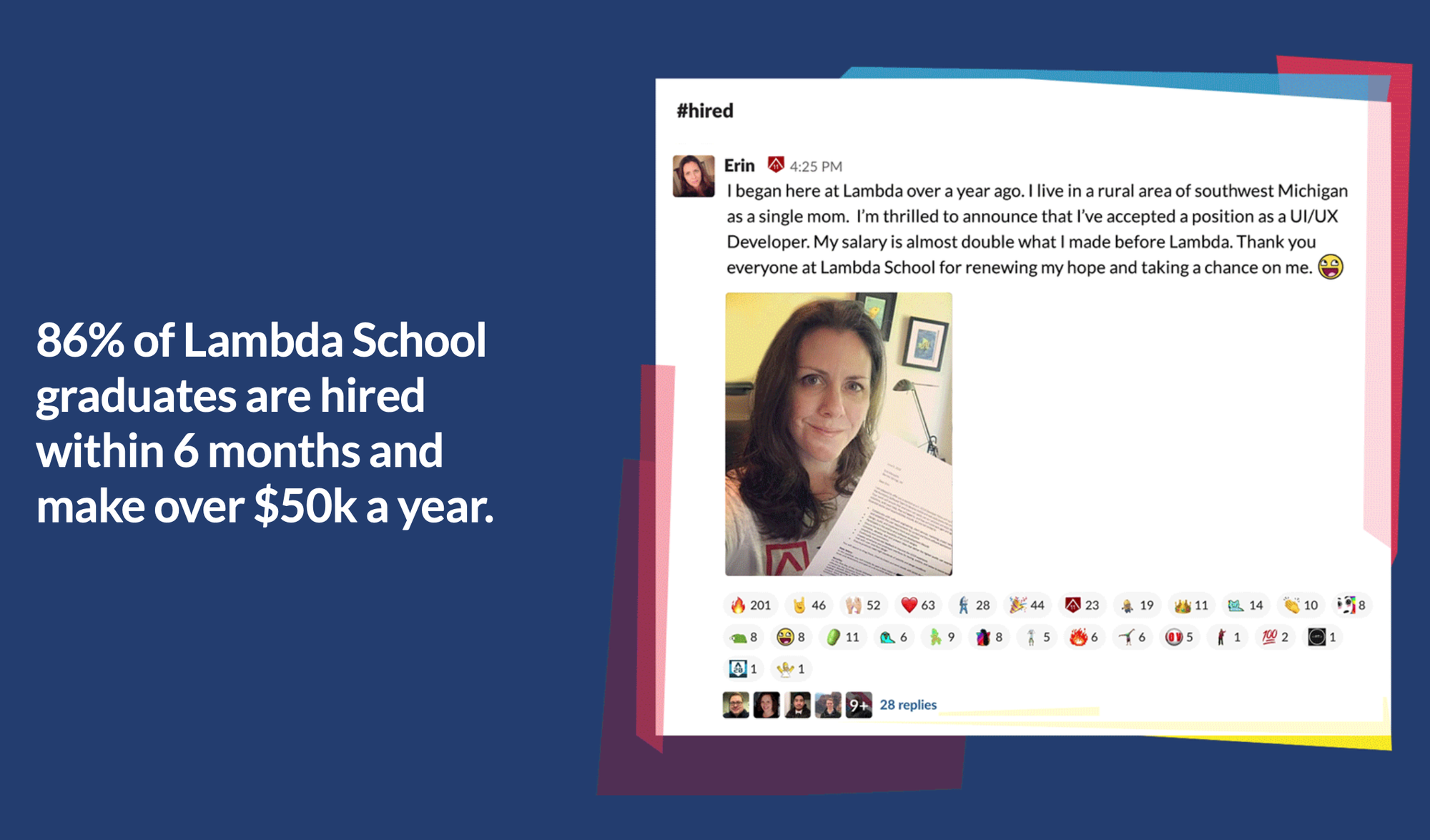
With these results, Austen challenged college head-on.
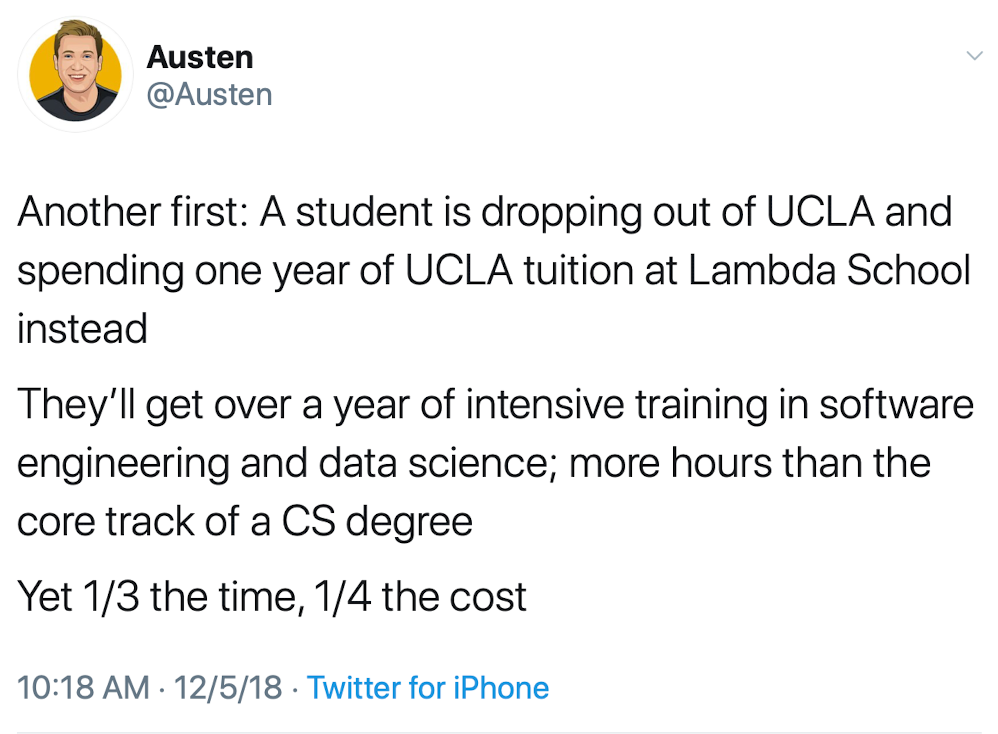
Esteemed names in tech became cheerleaders as they watched the company build bridges for the poor and needy to cross over into tech. On Reddit, the slightest criticism was drowned by mobs of supporters. In Silicon Valley, entrepreneurs envied the hype, and "Lambda School for X" became a meme.
Just as Amazon started selling books only to grow into the everything-store, Lambda School expanded beyond programming and into design. In 2019, their first UX class continued their legendary results.

In an interview with Wired that year, Austen said his next target was nursing. Behind closed doors, he negotiated with venture capitalists to value the company at $1 Billion. Lambda School was set to become the next unicorn.
There was just one problem: the program didn't work.
In early 2020, leaked communications with investors exposed dismal results. Most students weren't hired. What little money the school made came from quietly reselling student debt to hedge funds.
It turned out the income share agreements were rigged. When graduates landed jobs unrelated to programming— everything from legal assistant to mailman— the company went after them anyway.


Following the leaks, the company lost control of the narrative and their cheerleaders turned on them, realizing Lambda School was just another Uber, an unethical, untenable, profit-driven startup who took a gambit evading the law, hoping to grow too big to fail before the law catches up. Except Uber was good at being bad, and Lambda School combined malfeasance with incompetence, burning up to $11.8 million per quarter on a business that didn't work.
In under two years, Lambda School went from the hottest startup in Silicon Valley to a veritable pariah, unable to raise money as its bank account drained. As executives fled and investors expunged it from their resumes, a series of layoffs cut the school's staff from hundreds to dozens.
With mounting legal bills and an unredeemable brand, the company rebranded as, "The Bloom Institute of Technology." Disgruntled employees leaked the news a few days early, robbing the company the power to spin it as anything more than failure.
Things got worse from there, and we'll get to it. First I need to address a common question: what do I have to do with any of this? I have no professional or personal connections to the company or the team. What compelled me to follow this story for the last five years?
On the surface, this is another window into the 2010's tech bubble, a period where mediocre people could raise ludicrous money amid a venture capitalist echo chamber fueled by low-interest rates. But what makes this any worse than Juicero, Clinkle, or Humane? Why does this rise to the level of Theranos?
These stories hinge on their villains, whose hubris and stupidity end in comeuppance. Theranos had Elizabeth Holmes, Fyre Festival had Bobby McFarlane, and Lambda School has Austen Allred.
Austen's Twitter bio reads, "Will tweet as I wish and suffer the consequences," and it's true, as his 40,000 tweets provided damning evidence in his numerous legal battles. When he isn't promoting the company and attacking critics, he shares his love of capitalism, free markets, and his favorite billionaire.
Just as Elizabeth Holmes mimicked Steve Jobs, Austen obsesses over Elon Musk. In 2016, he put his entire life savings into Tesla stock. When Lambda School raised its first round of financing, he tweeted "Funding Secure," a nod to Elon's infamous tweet. Austen role-played as Musk, but lacked the power to get away with his antics.

Austen thought he could fake it 'till he made it. He lied about students getting jobs, the success of the company, and he even lied about being homeless.
The moment that defines Austen came on October 27th, 2021. A catastrophic leak revealed his company spiraling toward bankruptcy, and a confidential slide deck proved once and for all that Austen had lied about the job numbers. With nowhere left to hide, it was finally time to admit everything and apologize. Instead, he retreated to narcissism, burning any bridge to redemption.
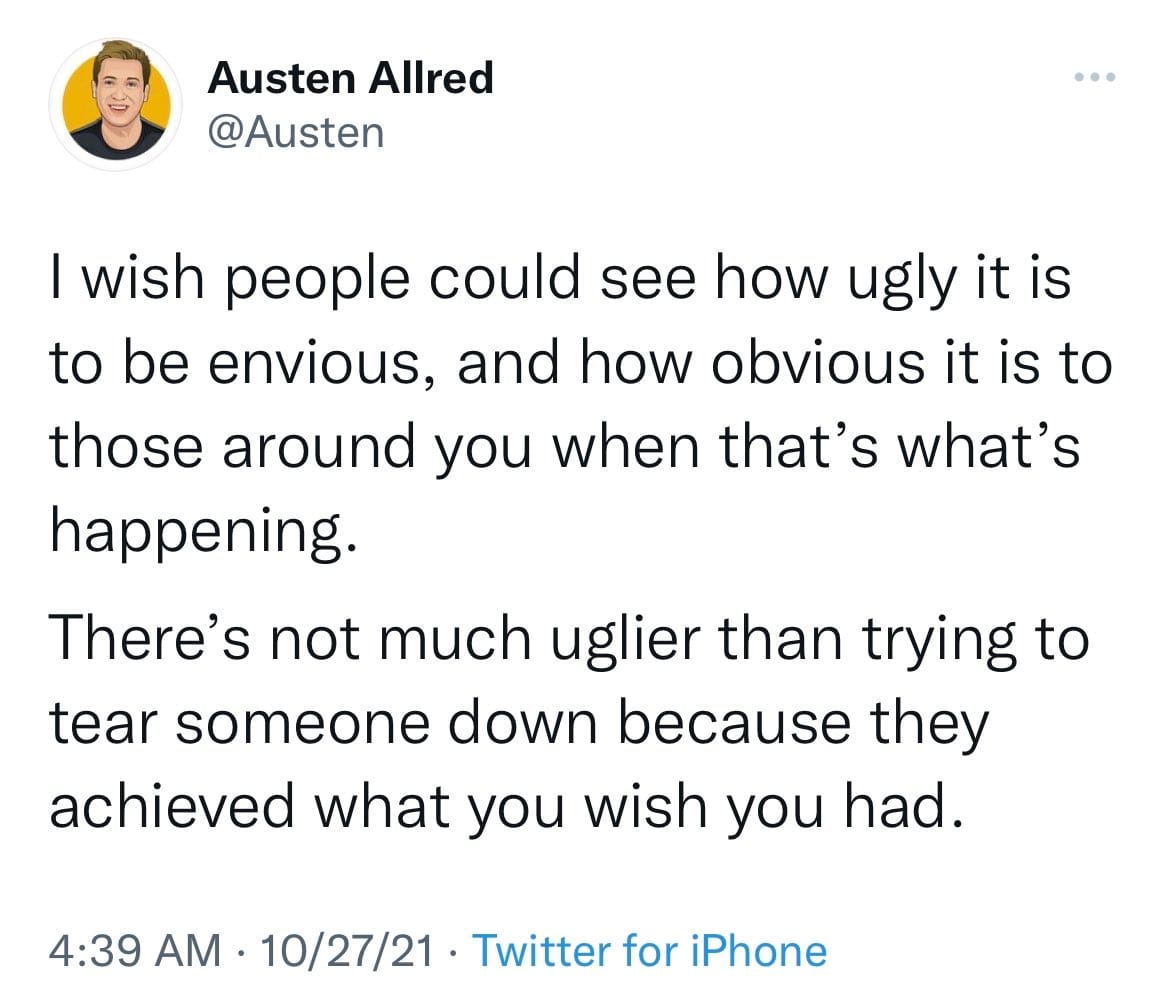
While his mind went to his own greatness, mine turned to his victims. I began tweeting about Lambda School in 2019, and the more I tweeted, the more students shared messages like this:
Hi Ben I just wanted to say thank you for your effort in exposing Lambda School. I was a student there and had a terrible experience. I dropped out last year (still on the hook for the 30k ISA) and since have been avoiding reading anything related to the school for my mental health. It sucks so bad that they are getting away with all of this, especially when the students are mostly minority or people who are in vulnerable positions
Lambda School targeted single mothers, the disabled, reformed convicts, and people struggling with serious medical problems. They lost tens of thousands of dollars, some lost years of their lives, on a broken, predatory program.
When students surfaced problems to staff, staff blamed the victims, gaslighting them with, "Trust the process," or blaming everything on "imposter syndrome." As the company unraveled, upset students overran the official /r/LambdaSchool subreddit with criticism. As Austen deleted posts, students created a rogue Discord to discuss legal options. Austen tried to contain things by pretending to be a student under a sock puppet account.
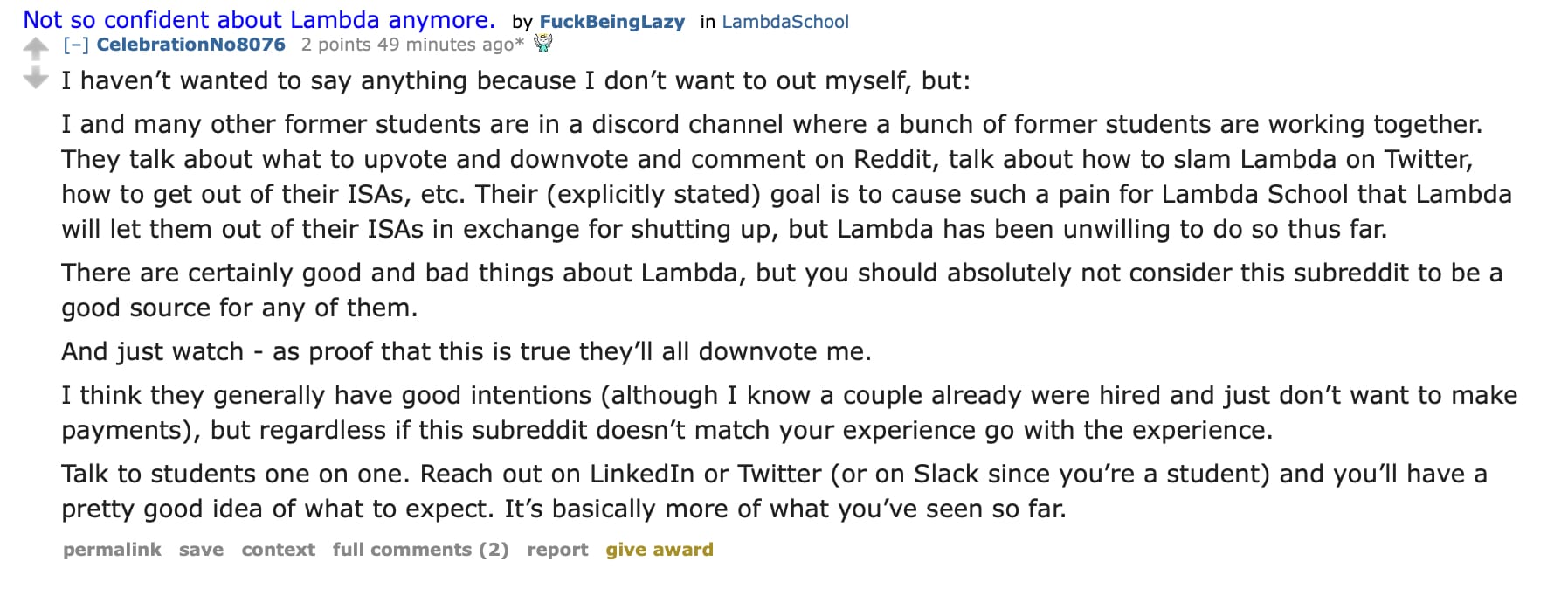
His efforts to save his subreddit proved hopeless, and so he set it to private. This is generally how the company handled victims. Upon enrollment, students sign away many rights to legal action, not that it matters much, as most students lack the resources to hire lawyers.
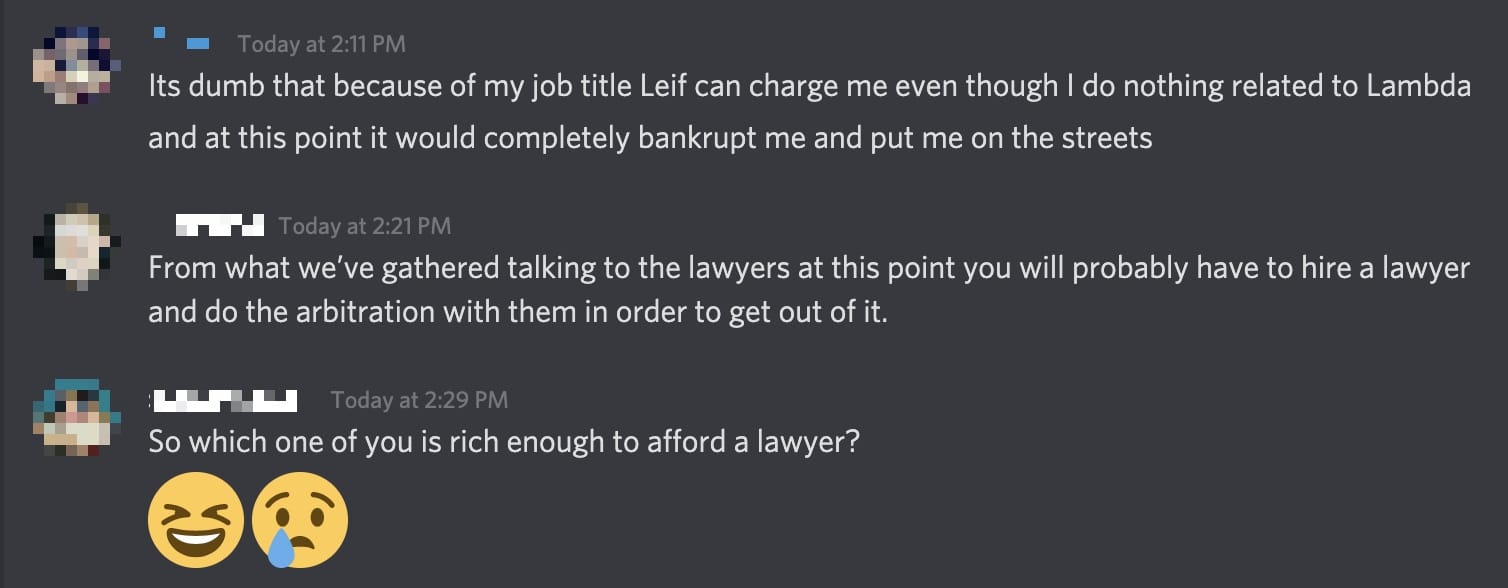
The rare time a victim scrounges together the resources to take legal action, the company rolled over, knowing they didn't stand a chance in court. However, they only released students from their contracts if they agreed to sign a non-disclosure agreement, robbing students the freedom to warn others.
I thought Emily Bruner would find justice. A single mother who signed up for Lambda School based on false job placement rates, Emily thought it would change her life, only to be saddled with a $30,000 debt. Emily was in luck, because Lambda School forgot to make her sign away her rights to sue. Her case was taken up by a non-profit legal organization that stands up for students taken in by predatory, for-profit schools.
After a long legal battle, Lambda School finally settled out of court, but Emily wasn't there to celebrate. She passed away suddenly the year before, at the age of 30, leaving behind her daughter.
A famous physicist said, "There are some things so serious that you have to laugh at them," and if there's anything that makes this story palatable, it's Austen's brazen stupidity. Consider how easy it was to connect him to his sock puppet account: he linked to his own tweets, and even posted a video of his golf swing.
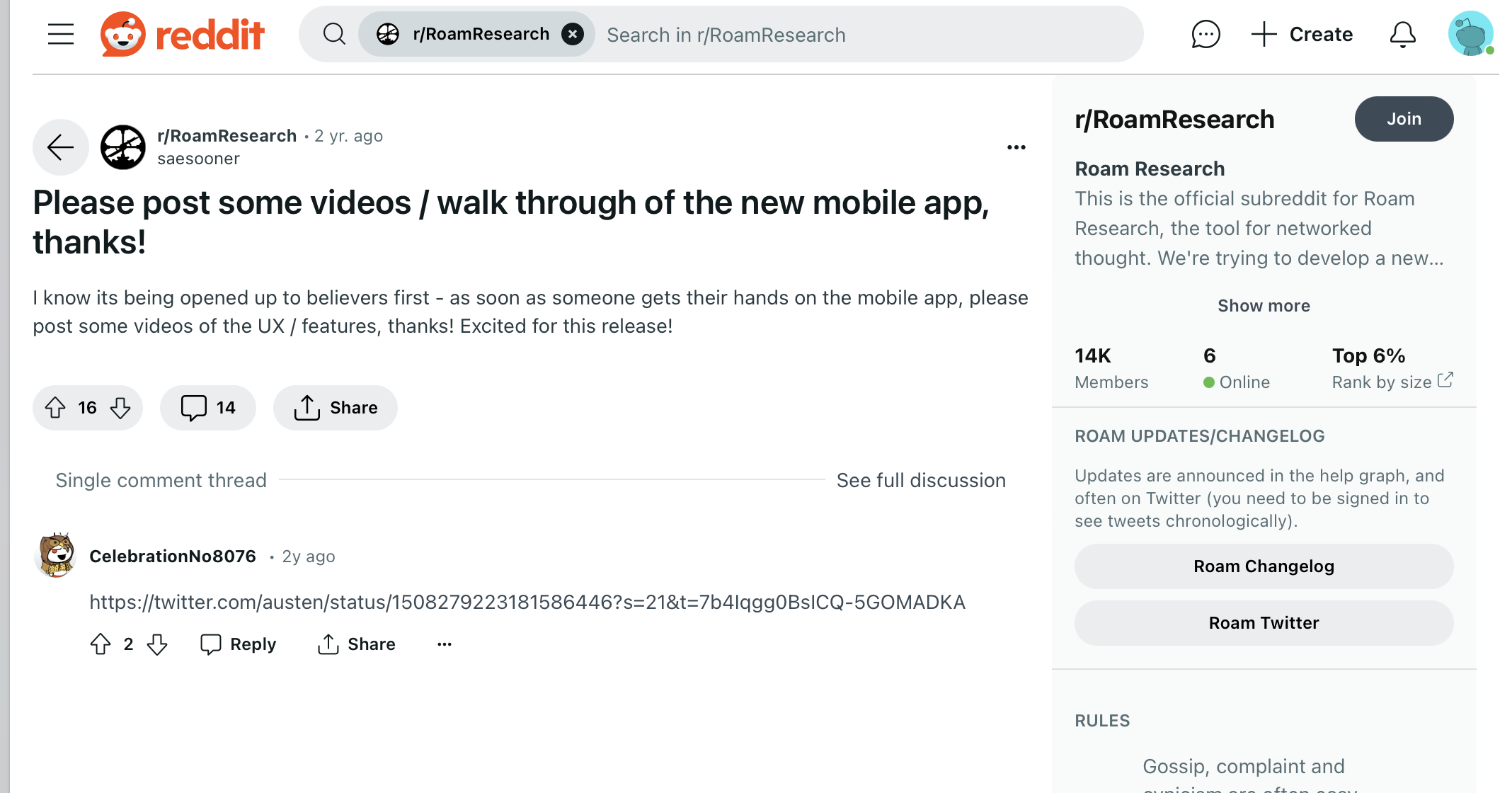


This is a story about Austen, his victims, and a once-shining startup that Silicon Valley wishes everyone would forget. How did it rise so fast and unravel even faster? We need to back up and replay Lambda School's collapse, in slow motion. It starts with the mystery of why venture capitalists handed over so much money.
The Early Years
Selling a Dream To Students and Investors
The rise of the 2010's tech bubble saw an explosion of tech jobs paying six figures. Just as most of the money in a gold rush goes to shovel salesmen, people who can't land high-paying jobs in tech sell training. You could find code bootcamps everywhere, from legit looking classrooms to some sketchy dude's house.
California has a bad history with this sort of education grift. Back in the 1980s, the state was the "Diploma Mill Capital of the World," and in response, they established a bureau to regulate for-profit schools called the BPPE. This bureau has nothing to do with accreditation. They don't care if you run a flat-earth school, they just want to make sure that you don't go around claiming 90% of your graduates get jobs as sea captains.
The BPPE went to work reigning in the flood of sketchy bootcamps, and by 2017, the combination of BPPE penalties, negative press, and general word of mouth left "code bootcamp" with the same sullied reputation as DeVry or The Art Institute.
As just another bootcamp late to the fad, Lambda School didn't stand a chance. But in 2017, common sense didn't apply to VC backed startups. This was a wild time when WeWork was worth twenty billion dollars. Lambda School just needed their pitch.
One of the first questions a venture capitalist asks is, "Why now?" Uber arrived at a time when taxis were annoying and everyone had a computer in their pocket. What made education ripe for disruption? Skyrocketing college tuition.

The problems in higher education are complicated, from the rise of predatory for-profit schools to the funding cuts at public colleges. It's out of the scope of this story.
Within the context of 2017, Lambda School's hook, "We don't get paid until you do," resonated with a generation saddled with insurmountable student debt. People were desperate for a solution, and venture capitalists were thirsty to get in on it.
Another problem familiar to tech VCs was the difficulty hiring coders during this boom. Tech companies were no longer gatekeeping jobs to college degrees, and some big tech companies started apprentice programs that welcome boot camp graduates.

When VCs looked at Lambda School, they saw a company with the potential to decimate Computer Science degrees the same way Uber destroyed taxi medallions.
At the same time, Income Share Agreements had a huge red flag in the form of decades of failed experiments. Milton Friedman proposed ISAs as far back as 1955, and many schools experimented with them over the years, from Yale in the 1970s to Purdue in 2016, shortly before Lambda School. Every school that tried them abandoned them, for reasons we'll learn in a bit.
Another red flag should have been the team. Austen cofounded the company alongside Ben Nelson and Caleb Hicks, two unremarkable former bootcamp instructors barely worth mentioning. Austen was the star of the show, but what did he bring to the table?
At the time, Austen's 53,000 followers on Twitter created an illusion of importance. At least, until you come across his bragging about a bot army and follow spam on Hacker News.

Austen had just packaged this sketchy advice into an eBook called, Secret Sauce: The Ultimate Growth Hacking Guide, which promised to show you how to "Exploit loopholes in social networks for major growth." It's a window into how Austen thinks about marketing.

Austen wrote that book as a side-hustle, while his day-job was in marketing at LendUp, a payday loan company eventually shut down by the Consumer Financial Protection Bureau for deceptive marketing.
I'm not surprised VCs gave Austen a pass on his work history, given LendUp was another Y Combinator company. I'm surprised they thought he could build a business. Bootcamps and mildly successful eBooks are small-potato endeavors that VCs label "lifestyle business". It takes very different skills to build a billion dollar company, and Austen was a mere carnival barker.
I think VCs were blinded by ideology. Silicon Valley leans libertarian, with part-time Y Combinator partner Peter Thiel bemoaning college and offering $100,000 to entrepreneurs willing to skip it to build a startup. Thiel's donation of $1.25M to Trump's 2016 campaign, along with a rousing endorsement at the Republican National Convention, finally created enough backlash to cause the firm to sever ties, but Y Combinator's founder, Paul Graham, sits so adjacent to Thiel that Graham even asks him to review his blog posts. Graham is the type of guy who thinks his early investment in DoorDash was a good thing for the world.
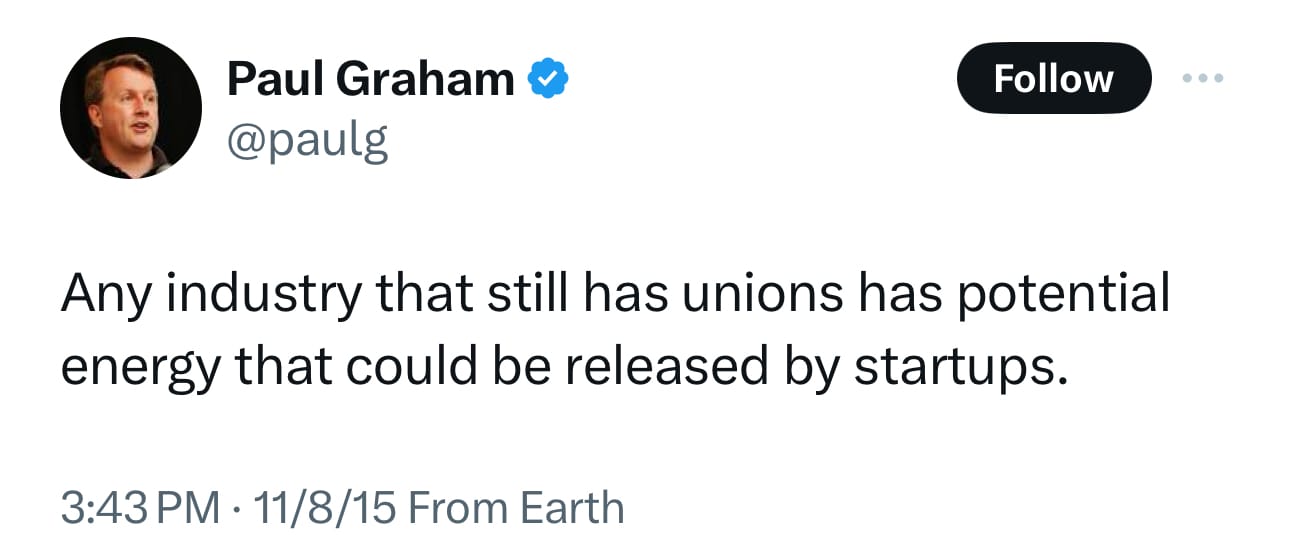
Austen pitched investors that the real problem in higher education is how schools make money regardless of whether or not you get a job. If schools only got paid when a student makes money, there's "Incentive Alignment." VCs like Graham fell for it because if all you know is capitalism, everything looks like a free-market problem.
In many ways, Lambda School mirrored the model of venture capital. Firms bet on a large batches of companies, and the money from the big successes make up for the flops. Funds even have incentive alignment in the form of bonuses the fund managers make when investments pass profit milestones.
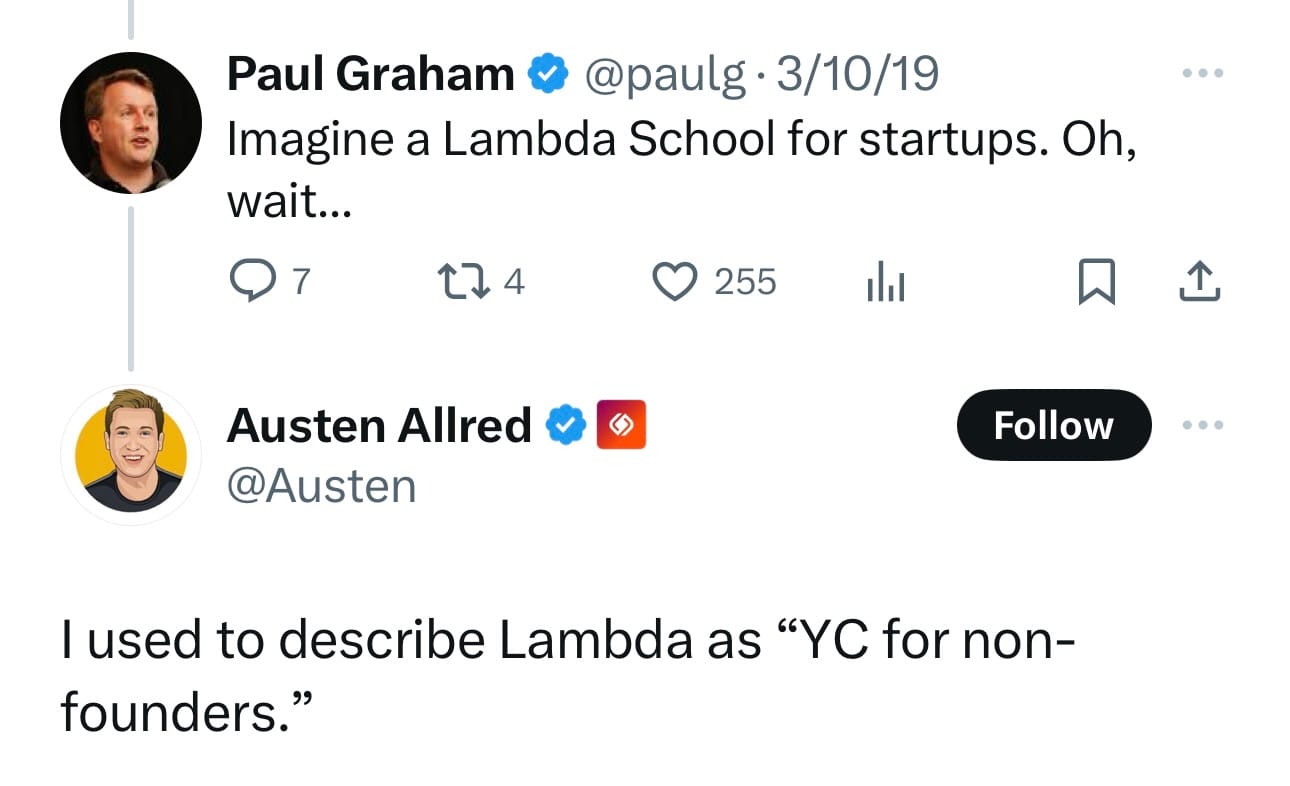
Graham took Austen under his wing, and when the company unraveled years later, Graham leaped to Austen's defense. To this day, Graham has never admitted any wrongdoing by Lambda School.
The Product
With millions of dollars in the bank and the backing of the biggest names in Silicon Valley, the cards were stacked in Lambda School's favor. All they had to do was deliver a solid education. They didn't. Actually, it kind of sucked.
At its best— burning money at an unfathomable rate— Lambda School was on-par with an average code bootcamp. Students got a taste of programming, but when it came to getting hired, neither the training nor credentials held a candle to a college degree. Yet Lambda School regularly compared itself to college in its marketing, promising, "The depth of a 4-year degree, the practicality of a bootcamp."
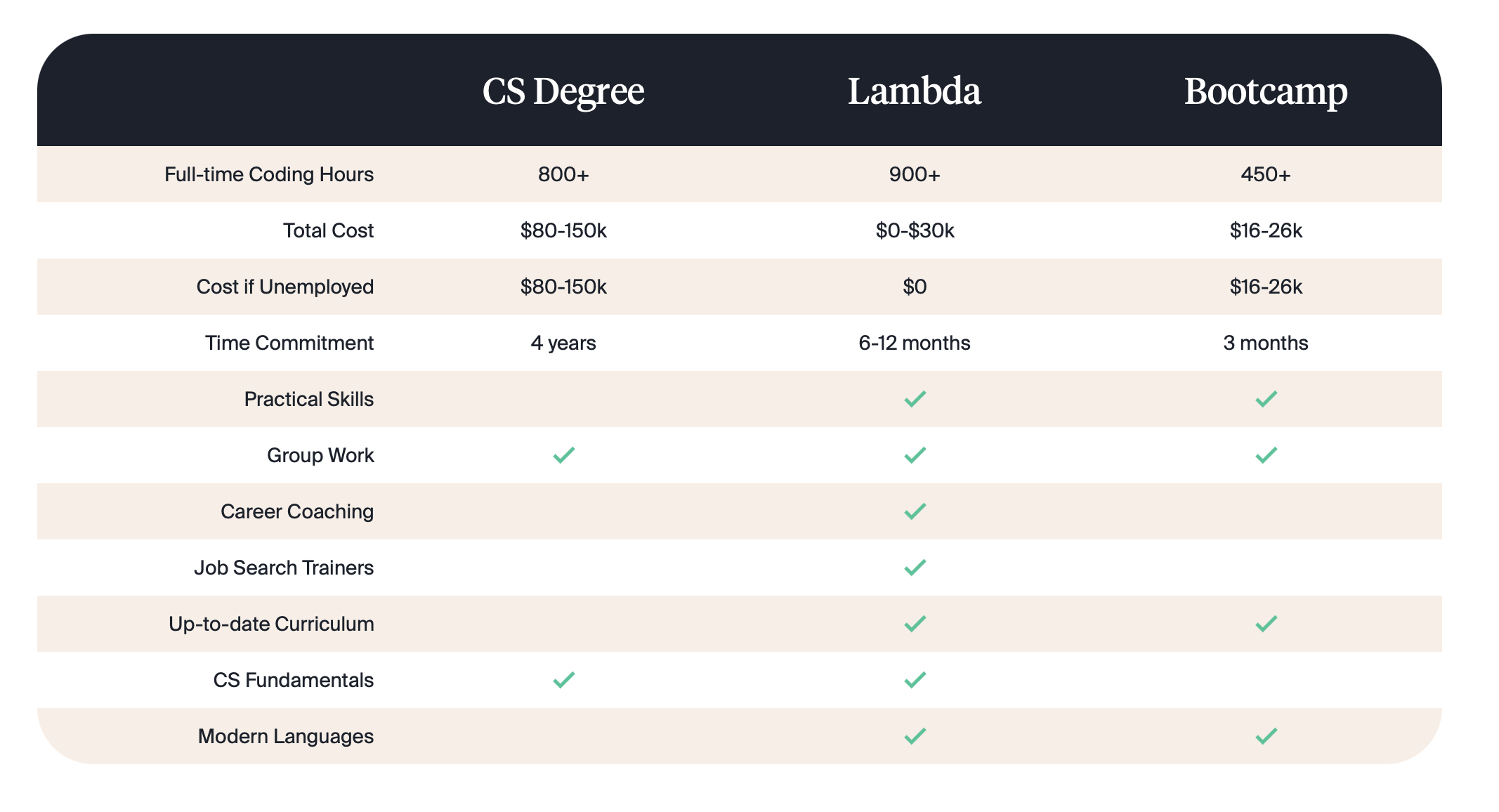
How could a six month class compare to four years at college? Austen claimed the program stripped out the non-programming portions of a computer science degree, but even after they expanded the program from six to nine months, the number of hours don't work out.
Let's skip the math, physics, and other code-free classes give you a foundational understanding of computers. Let's pretend that all you need from a Computer Science degree are the programming courses. In a reputable CS program, that's around two years of class time. How do you possibly fit that into nine months?
This ridiculous premise drove me to obtain a copy of the entire student curriculum, to figure out what the hell was going on. I dug into the area of my expertise, iPhone development.
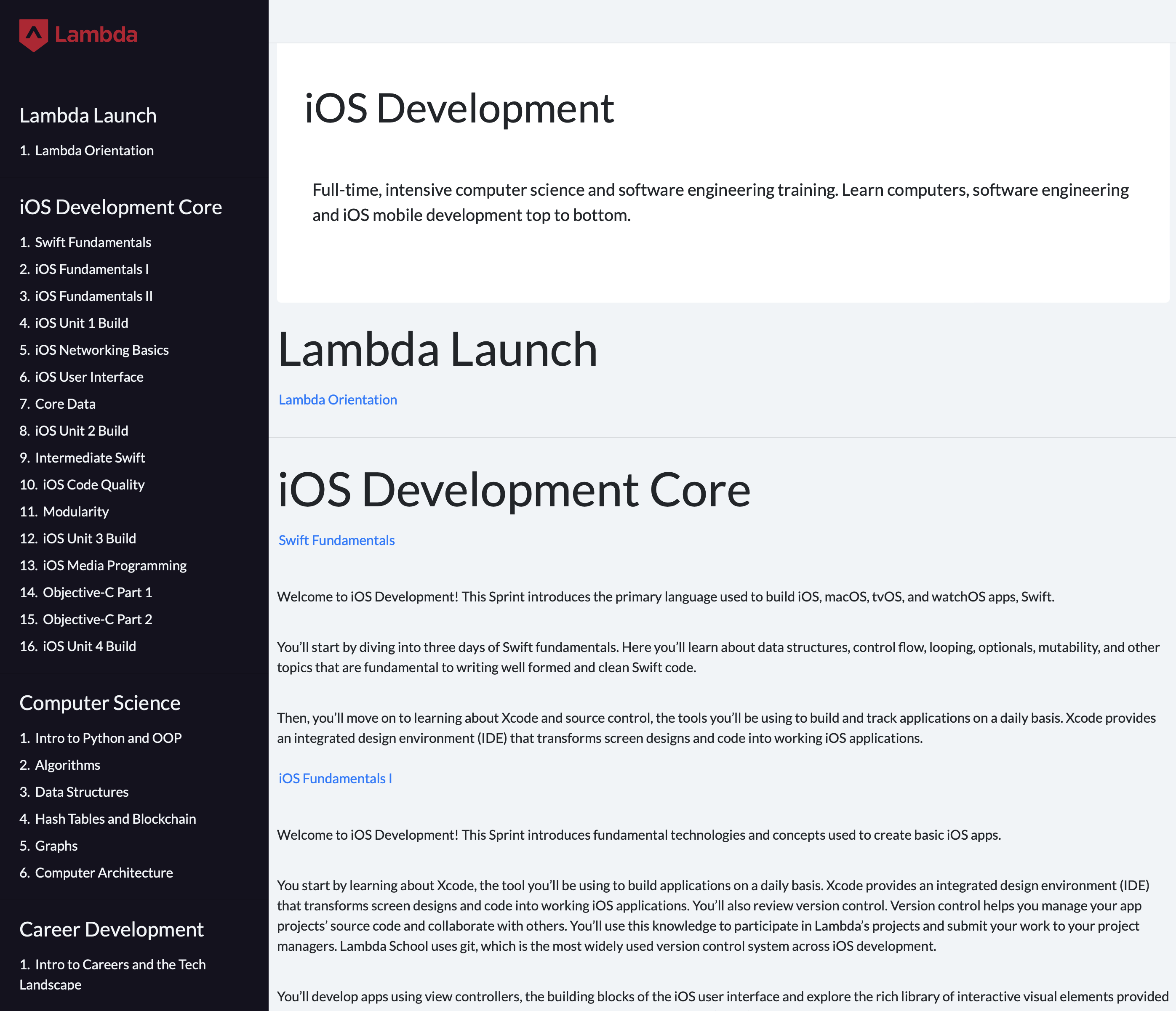
As expected, the curriculum was on par with an average coding boot camp. At best, it spends a few weeks skimming a handful of foundational CS concepts. Most time goes to drilling today's trendy technologies. You're welcome to argue that trendy technologies are the fastest path to an entry-level job, but it's downright fraud to say this matches the depth of a Computer Science degree.
A class is about much more than the material, so let's consider the teachers. Their marketing claimed instructors, "hail from the top companies and universities in the world." In reality, one iOS instructor had just graduated from a competing boot camp before getting hired, having never spent a day in the industry. The head of the data science program was Austen's brother, Ryan, whose only experience was another bootcamp and internship.
With cohorts containing upwards of 200 students, you were lucky to get access to teachers at all. To deal with the ridiculous teacher-to-student ratio, the company had a "Team Lead" system, similar to college TAs. They hired the better students in later units to mentor the students in earlier units.
Because the school encouraged students to publish their homework assignments online for self-promotion, I could dig into how many students struggle. Out of ten homework assignments I reviewed, I found that half contained memory management bugs that would have instantly failed them from the early stages of a job interview.
I reached out to the students in private to check that I wasn't missing something, and heard back from one. I asked if an instructor had issued him feedback in private. No, I was the first person to point out his bugs. I later found out that Lambda School had hired this struggling student to TA other students.
This lead to me to contact a hiring manager at a company that had interviewed an entire cohort of Lambda School graduates, only to reject all of them. He explained:
The issue was that most of the candidates didn't make it past the first two parts of our interview funnel. The first part is a take home challenge, no time limit but really should take like an hour or two to do and many entries just weren't completed or finished. And the second part of our interview is just debugging and a continuation of the take home with white boarding. It seemed like most students weren't fully prepared.
Many problems stemmed from Lambda School wanting to act more like a startup than a school, constantly experimenting with classes as if it were an early-stage product. That proved chaotic for attendees, as classes could radically change overnight. According to one student:
Things seemed fine in the beginning. The instructors were good, and I liked that there were actual live classes. Things degraded very quickly. They kept changing the format and the curriculum ("iterating"). They doubled the length of the program that I was in, which made it impossible for me to even finish it. I was working in a tech support job where we had to do shift bids and no shift was guaranteed. I enrolled in a plan that fit the shift I was working, and the expected end date, and when they changed the program length and format, I couldn't complete it.
They promised career guidance, including having a career councilor, but I never got one. They kept telling my cohort we would get our councilors after this or that milestone, but when we got there they would move the goalpost again. The closest we got was a resume course that was not relevant to tech at all and a resume review by another student.
In late 2019, stories circulated about the chaotic, haphazard training, with students likening the school to a cult. When students mobbed critics on Reddit, staff thanked them on Slack. When students brought up concerns about the training, staff took them aside and explained that they're just suffering from imposter syndrome. They were told that most of programming is just Googling for answers. I'll admit that's sometimes true, but the difference between a $50 Udemy course and a $30,000 boot camp should be human beings that help you through the material. Students felt the same way, but were afraid to push back out of fear of retaliation.
The school's tactic of gaslighting students couldn't go on forever. In late 2019, the new UX program proved to be a disaster, a far cry from the program Austen claimed had "100% hired." As students in the class began talking with one another, everyone realized they had the same issues, and they demanded to be released from their ISAs due to the school's negligence. The company refused, so the students shared their stories with The Verge.
Yet, many of the classes in the UX program seemed haphazard and poorly thought out to Nishida and some of his classmates. Once, during a drawing lesson that was ostensibly related to product design, students watched as the teacher sketched on a white sheet of paper. He said he was drawing a town, but the glare on the paper was so bright they couldn’t see what he was doing. When they spoke up, he grabbed a bedsheet and conducted the rest of the lesson under a makeshift curtain. To some, it felt like he hadn’t thought through the lesson — either the content he was presenting or how he was going to present it. “It highlights the unprofessionalism, incompetence, and disorganization of Lambda School’s UX program,” one student wrote in a note to Lambda.
With a program that bad, how did 100% of graduates in the first UX session get hired? Austen left out that only one student graduated. Yes, 1 out of 1 is 100%, and it illustrates how the company lied without technically lying.
Lambda School's marketing material cherry-picked a handful of success stories, leaving out the vast majority of failures. Of those successes, they left out important details. For example, a woman on the front page of their website has the caption, "went from stay at home mom to a Software Development Engineer at Amazon." They left out that, prior to motherhood, the woman was a professional programmer for seven years.
Lambda School was doomed because it couldn't decide who it was for. It marketed itself as a college replacement, but treated the material with the depth of a vocational school. They claimed there were plenty of humble programming jobs outside of Silicon Valley, yet classes wasted time on skills unmarketable outside buzzy tech startups, such as the blockchain.
The company's few remaining apologists blame its failure on everything from government regulation to companies biased toward college degrees, but make no mistake, the company failed because the program failed. This was supposed to be the point in the story when Income Share Agreements fix everything. Instead, we get to watch what happens when a good idea clashes with reality.
Why Income Share Agreements Failed
As mentioned earlier, colleges tried ISAs for years before Lambda School. Why abandon them? It seems impossible to construct ISAs in a way that benefits the student without exposing the school to significant risk.
It's expected that programs that offer ISAs will have worse hiring results than those that ask for payment up-front. Apologists blame it on students who attend for free, decide they don't like coding, and drop out because there's no "skin in the game." Maybe that's a thing, but I think it's much more likely that the students who need an ISA, the students barely getting by, face more struggles than the people who can afford to pay up-front.
If a school wants to reduce risk, they could be more rigorous in admissions, only accepting the students they're sure will pay them back. That means either denying admission to anyone who genuinely needs the ISA, or charging different people different prices based on their risk. If you squint, this looks like an argument for payday loans. If nobody else will service these groups, is it better to offer something at a higher price than to offer nothing at all?
Push past these ethical quandaries and we get to the technical problems. How do you prove that the school did its job? If a student majors in math and finds a job in programming, does that count? What happens if the student gets hired, but gets laid off a month later?
As you go down this path, you speed-run the student loan system, reinventing concepts like hardship-deferments and income-driven repayment forgiveness. We should absolutely overhaul American education, but if we want to make lives better for millions of indebted students as quickly as possible, the fastest pain relief would come from better educating people on existing escape hatches.
Going back to ISAs, let's focus on the thorniest clause of the contract: "You pay nothing if you don't find a job in a related field within X years." What is a fair value for X? If you pick 'one year,' students may take on an unrelated job just to run down their clock. The longer you pick for the length, the more it benefits scammers.
For a clever scammer, ISAs offer a smoke screen. As early warning signs about Lambda School popped up, critics were met with, "How can it be a scam? You only pay when you get a job!" If the company stayed afloat, it must mean the program works?
It takes several years for an ISAs to pay back the company, yet a company needs that money right away, because teachers don't take rain checks. Lambda School's solution was to sell half their ISAs to hedge funds at a discount, in exchange for cash up front.
Nobody told the students about these deals. Their marketing claimed, "We don't get paid until you do." Students thought that if the school was solvent, the program had to work, right? In reality, the company was burning through venture capital at a staggering rate, and propped up by hedge funds.
When these hedge fund deals were exposed, Austen claimed that he never lied about it. He argued it didn't make a difference, anyway, because Lambda School was still incentive-aligned. He argued that if the program didn't work out, hedge funds would stop buying the ISAs.
That's exactly what happened. In February of 2020, Lambda School's ISAs disappeared from Edly, an ISA marketplace. The hedge funds were done being bag holders.
When a startup with an inexperienced founder struggles, investors bring in an 'adult' to fix things. Following their first round of layoffs, Molly Graham was hired as Chief Operating Officer in May of 2020. Graham had worked at Facebook from 2008 to 2013, making her Lambda School's first executive with any experience at a successful startup.
Two months later, she explained the startup's dire situation at a company all-hands meeting: on average, the company spent $13,000 on every graduate, only to see $5,750 back.
This is supposed to be the moment when Income Share Agreements save the day. The school just needs to slow down, buckle up, and… uh… what exactly?
For an ISA to work, a school needs the self-awareness to accept they have a problem. Instead, Austen blamed employers for refusing to give his students a chance. Instead of fixing the training, he tried to disrupt his way out of the problem, leading to the launch of the company's dumbest product: unpaid internships.

Companies could "try" an engineer at their company for four weeks at no cost. It was right there in the FAQ:
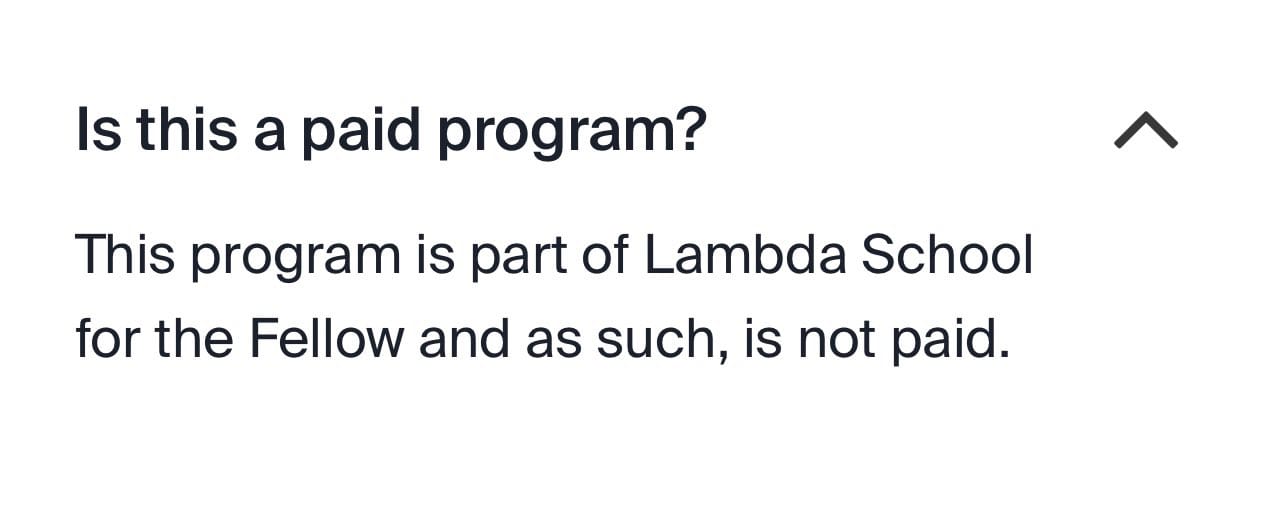
In the words of Paul Graham:
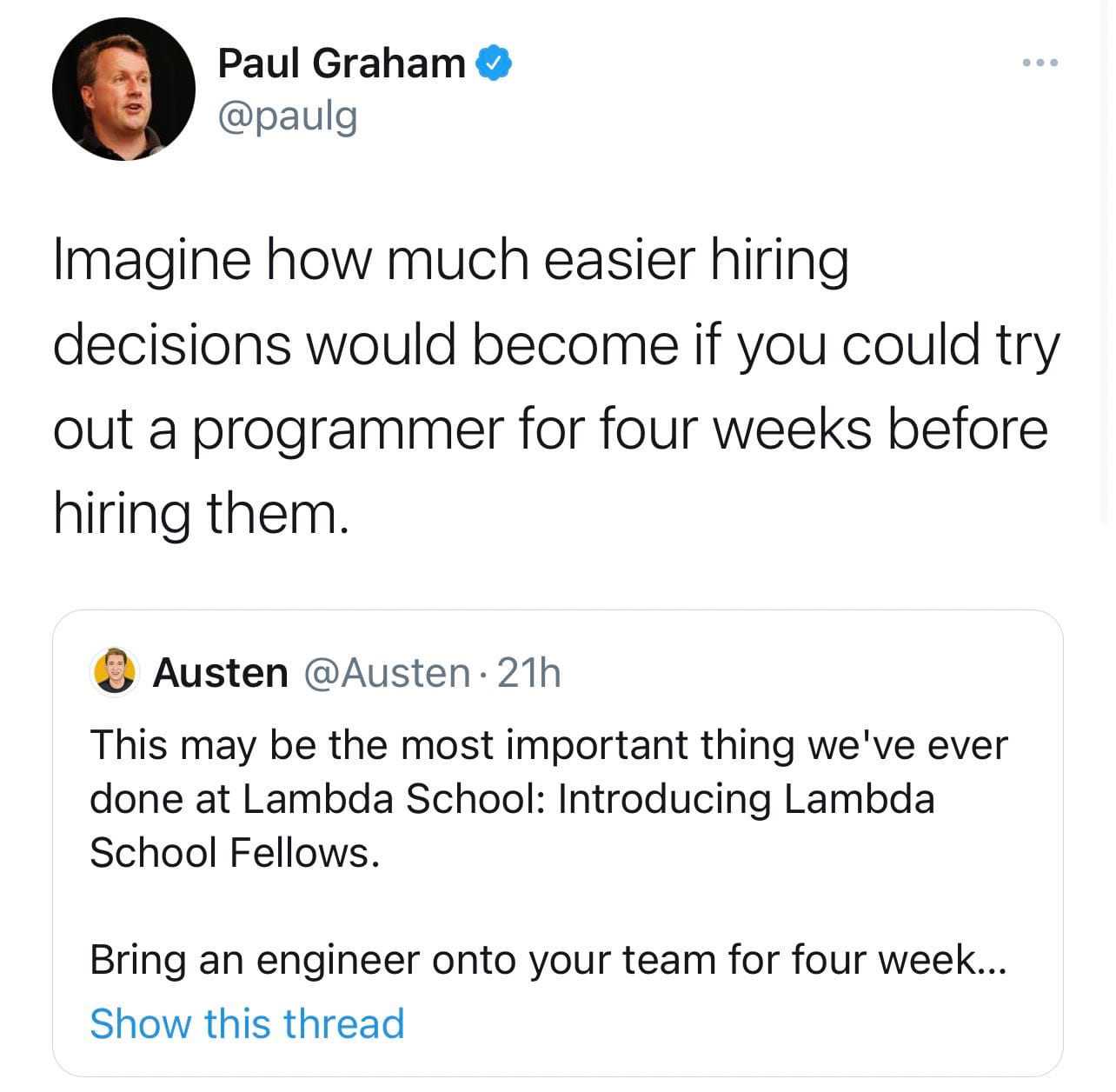
Every developer on Twitter revolted, burning any goodwill that remained for the company. Following the backlash, Austen apologized, but deleted the apology a few minutes later.

He then pretended that they always planned to pay the interns, and that this was all a giant misunderstanding.
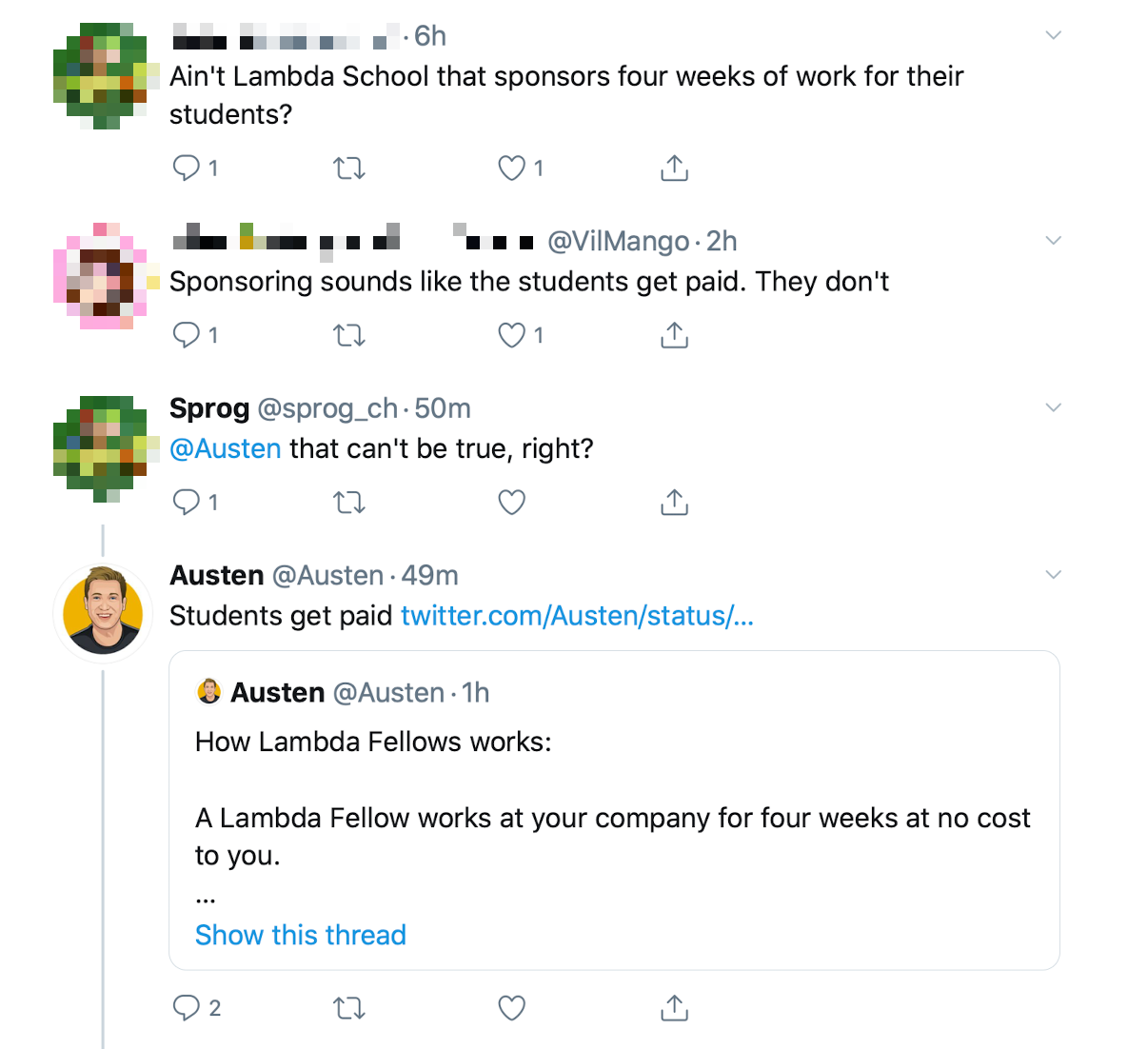
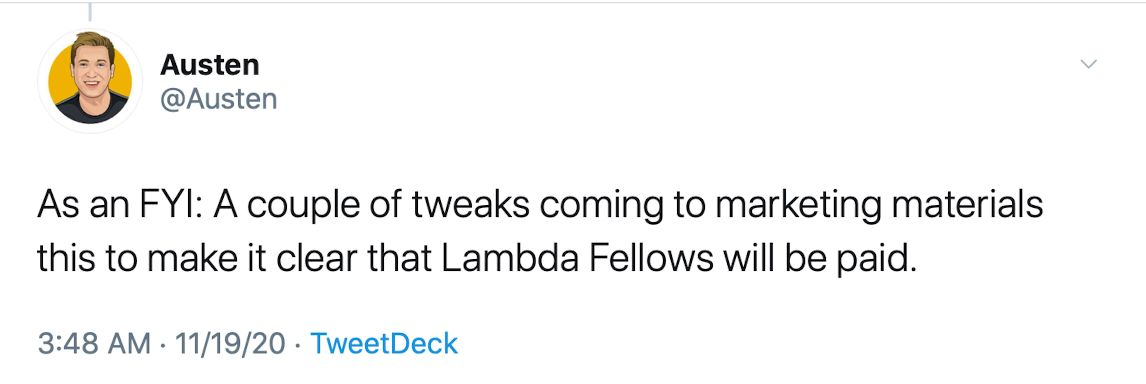
Tweets a few hours after the Lambda Fellows launch
Lambda School eventually paid interns $15 an hour, only adding to its financial problems. Behind closed doors, the quest for profitability would further unravel the program.
It may be difficult for honest schools to offer ISAs, but at least they protect students from scammers, right?
Imagine I offer a class that teaches the secret to winning the lottery. The class is free, but you agree to pay me 17% of your earnings if you win. If I teach enough people, someone will eventually win the lottery through none of my help.
You can structure a scam around an ISA by inserting fine print that holds people to their debt many years later, whether or not they find a job related to what they studied. Then you cast as wide a net as possible, signing up as many people as possible. Run classes at low overhead, and then just scale your way to riches.
From the beginning, Lambda School was designed to run cheap. With classes run entirely online, students attend from across the country, with hundreds crammed into a single Zoom session.
From the beginning, Lambda School's ISAs had bizarre fine print, like the five-year term that applies from whenever you graduate or (just as likely) drop out. After the program, you could find zero work, go back to school for an associate's degree, and still owe the school money. Income Share Agreements only protect students if they're willing to give up their dream of becoming a developer.
Then there was the refund policy. While the program lasted 40 weeks, students were on the hook for 40% of their ISA after week four, and 100% of their ISA debt after week ten. According to students, the staff front-loaded all the good material to lure students past the trial period.
Lambda School was always rigged, but subsidized by millions in venture capital. By early 2020, it was clear the program didn't work, and they could see bankruptcy over the horizon. The best thing that happened to Lambda School was COVID.
As the world shut down with the pandemic, technology was the one industry that thrived, and big tech companies were desperate for employees. Lambda School intersected the two areas with the most potential: online-only classes, and training for tech jobs. Despite all the controversies, they announced another round of funding in August, 2020.
They had one chance to change the trajectory of the company. Following Molly Graham's all-hands meeting that revealed their dire financial situation, she laid out the plan to set things right.
In Fall of 2020, Lambda School decimated its program to save money. Not only did they cut the program from nine months to six months, they also removed all paid TA positions, replacing them with "Peer mentoring." Students in later units were expected to mentor students in earlier units.

This was catastrophic, because Lambda School's huge class sizes left little time for instructors to spend one-on-one time with students. TAs were essential for students to keep up, and they were now replaced by students upset by unpaid work. This led to people coasting through the program without anyone so much as glancing at their homework.
This all happened mid-program, screwing over students already on the hook for tens of thousands of dollars of debt. Soon, students formed their own Discord to consider legal options, and the official Lambda School subreddit was flooded with angry students revolting against the changes.
Slashing the program couldn't stop the bleeding, and April 2021 saw a major layoff that cut 65 of their 200 employees. While this bought the company more time, it needed to completely rethink its business, but most of Lambda School's executives weren't up for that ride. Austen's cofounders, Ben Nelson and Caleb Hicks, quietly resigned in April and June of 2021, and Molly Graham resigned that October.
In November 2021, Lambda School rebooted. Income Share agreements were still available, but with ridiculous terms. Instead of $0 up front, students now paid up to $7,950. The maximum repayment cap was raised to $42,950. Most importantly, they removed the promise that you only paid back your ISA for a tech job; now you were on the hook for any job over $50,000 a year.
The new Lambda School put heavy emphasis on traditional loans that charge up to 18.95% interest on $19,000 in tuition. They included a "Tuition Refund Guarantee." They claimed that if you don't get a job within one year, you get a 110% refund, but the fine print is ridiculous. Students must apply to ten jobs per week, reach out to ten strangers per week, and post ten code changes online per week, for 40 weeks in the next year. It's the student's responsibility to track all of this.
Alongside the pivot away from ISAs, the company changed its name to "The Bloom Institute of Technology." Everyone on the Internet rightfully assumed it was to escape the negative publicity, like when Philip Morris renamed itself Altria. If you Googled "Lambda School" at the time, the first page turned up their crimes and painted the picture of a school on the cusp of collapse.
Austen claims the rebranding was all about a trademark dispute… and technically that is true. Back in 2019, the AI hardware company Lambda Labs sued Lambda School for the Lambda in its name. But what were the grounds for its case?
According to the lawsuit, Lambda School's deceptions damaged its brand.

As the case dragged on, Lambda School went so far as to acquire the "Red Lambda" trademark from a company in Florida to defend its ownership.
After fighting this case for years, why did they suddenly give up? It's true, lawsuits are expensive and the company was burning through too much money, but that doesn't explain the scale of their rebranding.
Normally when companies settle these disputes, the loser negotiates to change things as little as possible to make the winner happy. For example, when the World Wildlife Fund went after the World Wrestling Federation for "WWF," and the latter agreed to change their name to "World Wrestling Entertainment" and made minor tweaks to its logo.

If you wanted to save Lambda School's brand, you might do something as simple as turning the Lambda into a Delta. Delta signifies change, and the school is supposed to change students, so I'd argue Delta is actually better than Lambda from a messaging perspective.

That's just one possibility. Obviously there's more that goes into this, like searching the trademark registry, but the goal is to stay as close to the original as possible. They didn't do that because their brand was now worthless, and the trademark lawsuit was a perfect excuse to throw it all out. However, try as they may to run away from their past, there's no outrunning justice.
The Fall of Austen Allred
The journalist who exposed Lambda School wasn't a journalist by trade. Vincent Woo was a successful entrepreneur best known for CoderPad, a collaborative coding website used extensively in programming job interviews. After he sold CoderPad for millions of dollars, he focused on the public interest, such as housing activism.
Woo's work on CoderPad gave him expert insight into the programming job market, and in 2019, Austen's outrageous hiring numbers set off red flags. Whenever pressed for more details on his outrageous claims, Austen said a full report was coming soon, but six months would pass without any updates.

Woo obtained an investment memo Lambda School sent out to Y Combinator titled, "Human Capital: The Last Unoptimized Asset Class." In it, they disclose, “We’re at roughly 50% placement for cohorts that are 6 months graduated,” contradicting the very front page of their website.
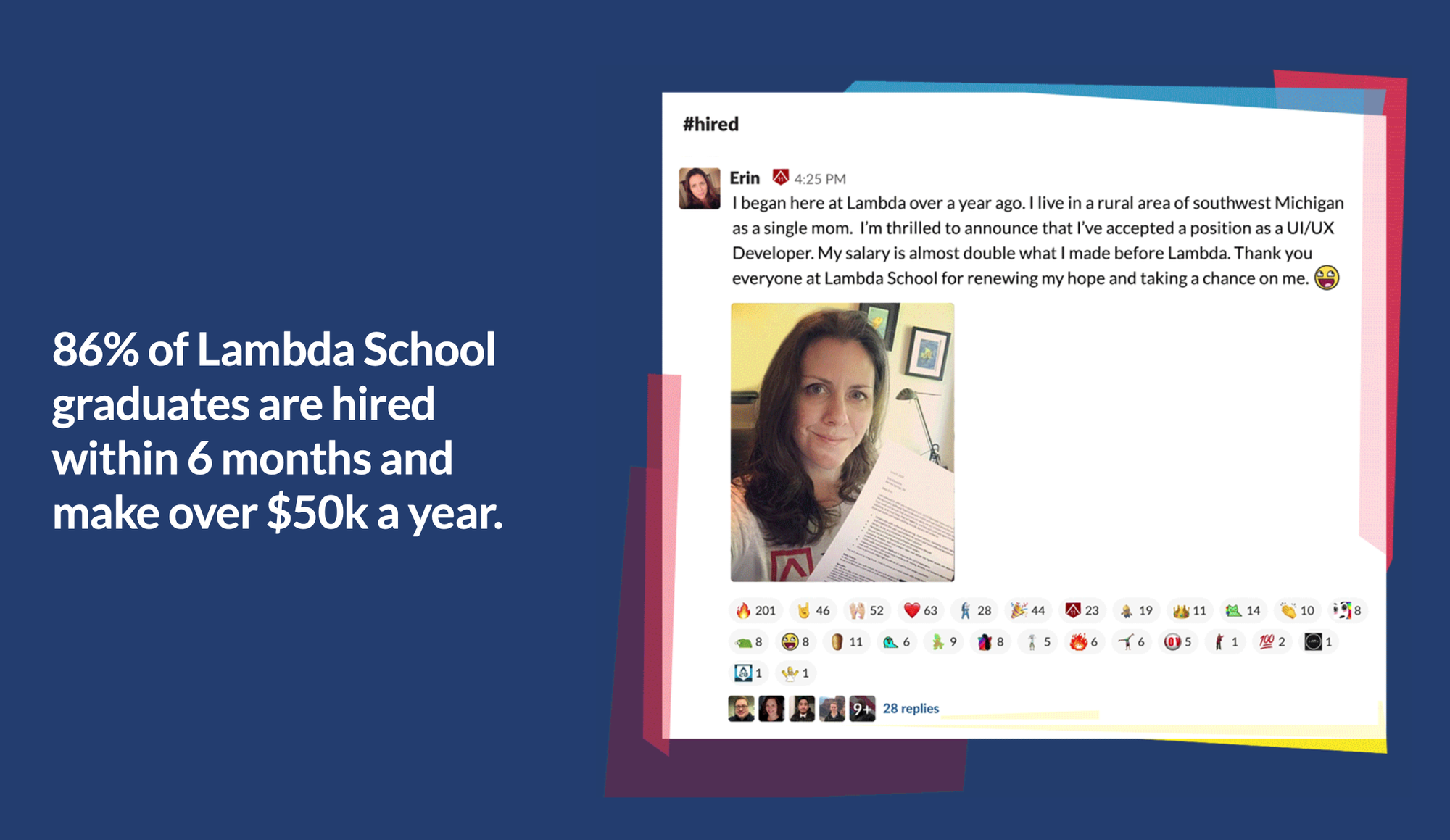
Where did the 86% on their homepage come from? In 2018, Lambda School submitted a single report about 72 graduates to CIRR. CIRR is an organization formed by the boot camp industry following the boot camp crackdown of the 2010s, to cleanup their image. Bootcamps are supposed to submit their hiring stats every six months, in one standard format, to prevent underhanded boot camps from fudging the numbers. In two years, Lambda School had produced nothing beyond that single, small report.
Woo reached out to Sabrina Baez, Lambda School's former Director of Career Readiness. Baez oversaw job placement in those early days, and Austen had reprimanded her for low hiring rates. She told Woo that probably only 50% to 60% of graduates found jobs.
Finally, Woo obtained private communications with investors revealing the quiet deals with hedge funds. This flew in the face of their marketing's, "We don’t get paid until you do," and Austen's now-deleted tweet, “We never, ever get paid upfront for ISAs.”
With all the damning evidence, the story was ready. Most reporters would now email their subjects for comment, but Woo elevated the story to performance art. He asked Austen for a recorded interview, without revealing its nature. Austen, lulled into a false sense of security by tech press puff pieces, agreed. What followed was the most riveting hour of tech journalism I've ever heard.
Austen: "Our goal right now, is that if a student is endorsed, call it graduation, that we place 80% within 120 days."
Woo: "Why did you tell investors 50?"
Austen: "What… I don't know… what communication you're referring to."
The interview went downhill from there, as Austen scrambled to invent excuses.
NYMag published Woo's story on February 19, 2020, and that very same day Lambda School pushed out a blog post announcing they resold ISAs.
One month later, Austen published a report purporting 71% job placement rates— but he arrived there by removing the "$50,000 or more" bit. He claimed that the 50% he had told investors was actually total enrolled students, not graduates. Yet if you dissect Austen's own data, you quickly arrive at 55%.
Moving forward, Lambda School's job reports only counted graduates who were "job seeking." This is a common trick where bootcamps make up reasons that they don't have to count the graduates who couldn't find jobs. If a graduate, say, stops working with a useless career coach who mostly blames them for not trying hard enough, then the bootcamp classifies that graduate as no longer job seeking. In Lambda School's last outcomes report, they gloss over the 34% of graduates who were not job-seeking, as if it's perfectly normal for someone to go through an intense nine-month program and just change their mind.
On October 25, 2021, Vincent Woo delivered a follow-up story, published by Business Insider. Not only did it leak the company's infamous 2020 all-hands meeting that exposed the company's downward spiral, it also revealed that only 27% of graduates found jobs.
It wasn't because of COVID. Tech only saw a minor dip at the start of the pandemic. In fact, tech companies were so thirsty for talent that it was easier than ever to get a job as a developer without a college degree.
The reason Lambda School's hiring rates dropped should be obvious to anyone who spends time around bootcamps, or education in general. Lambda School tried to scale up. Small schools and small class sizes have better results, largely because it's hard to find good instructors, and people need a lot of 1:1 attention. Bootcamps don't scale up to become billion dollar businesses.
Staff warned about a downward trajectory back in 2018, in an internal memo that said, “Placement to date has been manual and one-off, which isn’t possible to scale.” That was back when they were training a few hundred students a year, and at their peak, they trained 2,700 students.
In response to Woo's latest story, Austen claimed that the numbers were wrong, but couldn't explain why he'd present wrong numbers to his entire company. Despite his denials, the layoffs and executive exodus made it clear to outsiders that Lambda School had crashed and burned.
Two days later, Austen tweeted:
I wish people could see how ugly it is to be envious, and how obvious it is to those around you when that's what's happening.
There's not much uglier than trying to tear someone down because they achieved what you wish you had.
Is he talking about Vincent Woo? Woo's CoderPad made a lasting impact on tech hiring, and he successfully sold that company for more money than Austen could ever make from Lambda School. What could Woo possibly be jealous of?
Some blame for this distortion falls on Paul Graham. Back in December 2019, at the top of Austen's downward spiral, Graham gave him a pep-talk.

Graham later turned it into an essay about "Haters." He wrote:
What sort of people become haters? Can anyone become one? I'm not sure about this, but I've noticed some patterns. Haters are generally losers in a very specific sense: although they are occasionally talented, they have never achieved much. And indeed, anyone successful enough to have achieved significant fame would be unlikely to regard another famous person as a fraud on that account, because anyone famous knows how random fame is.
In the footnotes, Graham even thanked Austen for reviewing it, his name alongside Elon Musk and Peter Thiel.
Graham published that essay on January 11, 2020, and Woo recorded his fateful interview with Austen eleven days later. That humiliation still haunted Austen two years later, as he struggled to paint a picture of a thriving company.
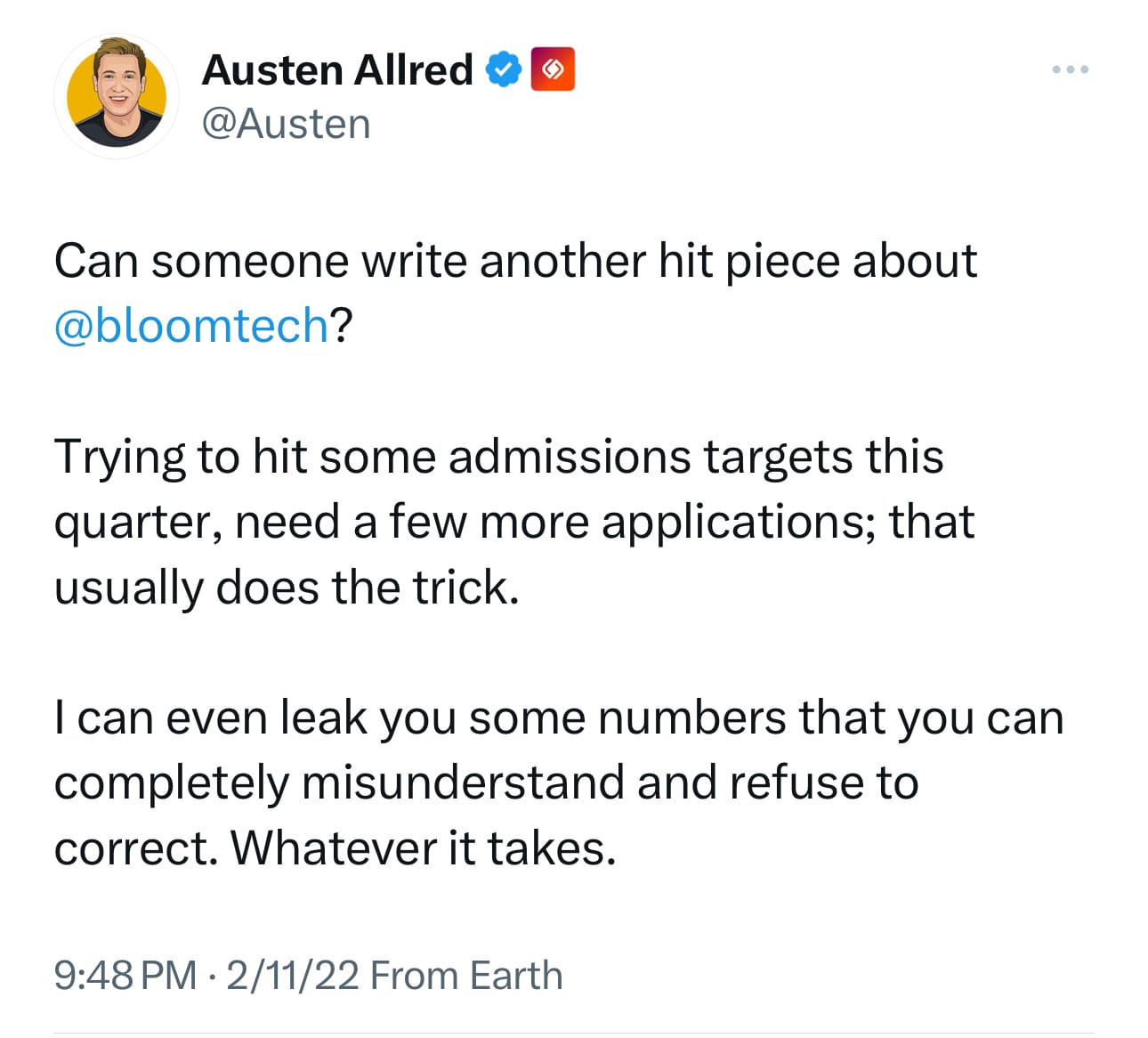
Following Woo's reporting, Lambda School was pressured to publish regular, audited job reports. Those reports included the total number of students who attend every year, and if you graph it you see a company in freefall.

Contrast that with the explosion in tech job openings following the pandemic.

Asked why so many people want to see him fail, Austen posted a thread full of theories.
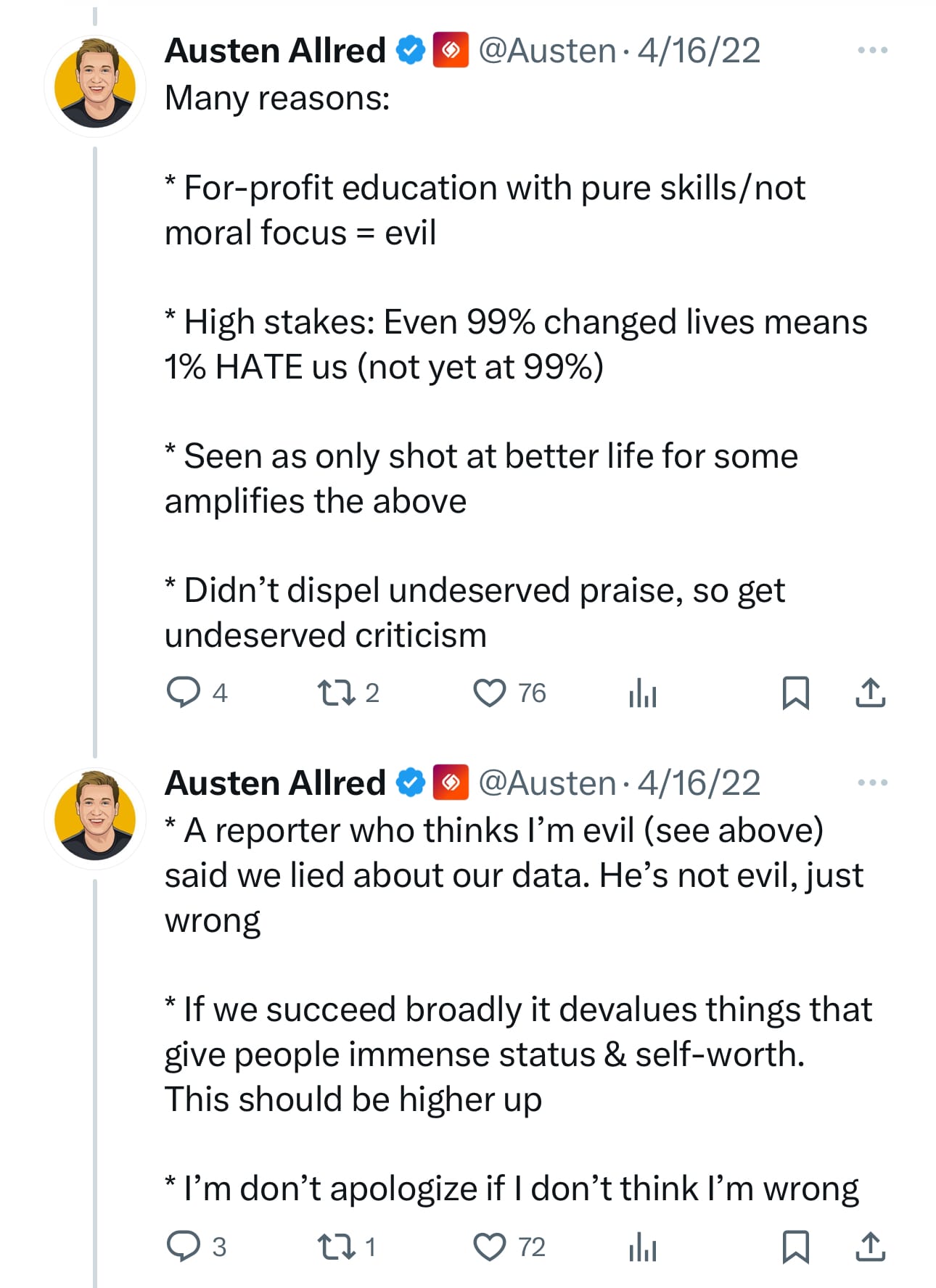
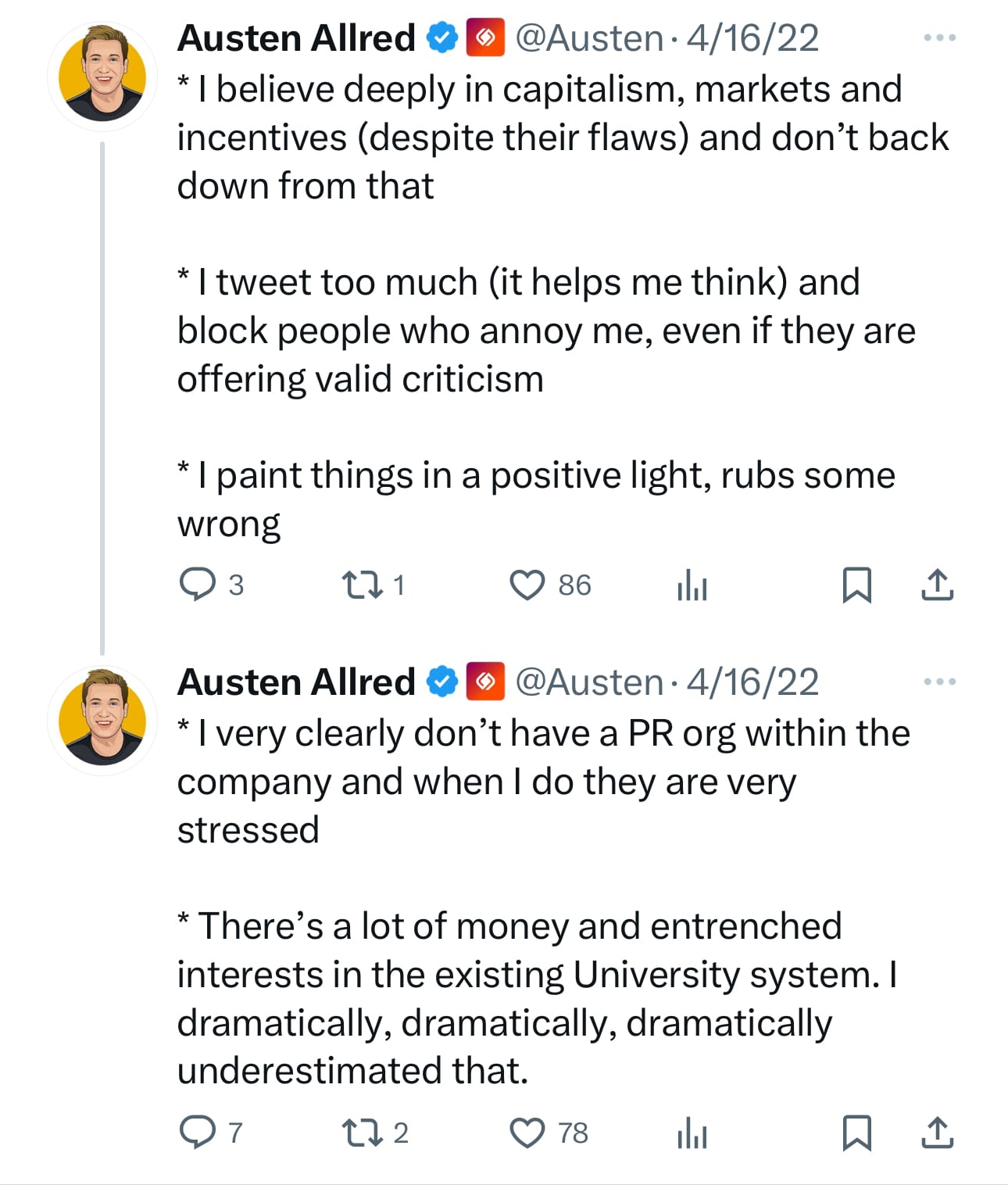
It's true, tons of people want to see him fail, but it has nothing to do with the university system or his love of capitalism. It's because every time he's caught in a lie, he recites the Narcissist's Prayer:
That didn't happen.
And if it did, it wasn't that bad.
And if it was, that's not a big deal.
And if it is, that's not my fault.
And if it was, I didn't mean it.
And if I did, you deserved it.
Consider the time Austen tweeted that 100% of the students in his UX class had been hired, when only one student graduated. I confronted him about it on Hacker News, pointing to screenshots in The Verge article. He replied:
I did say the hiring rate of a cohort of one student was 100%. And in the same tweet I said, in all caps BUT VERY SMALL SAMPLE SIZE. Odd how that doesn’t make the article, don’t you think?
For the record, the article included "VERY SMALL SAMPLE SIZE," twice, and I think that makes him look worse. Either he genuinely thinks a vague disclaimer is a get-out-of-jail-free card, or he's using the classic narcissist bluff of projecting so much confidence that the accuser wonders if they're the idiot for bringing this up.
In another incident on Hacker News, I mentioned Lambda School's unpaid intern program, Lambda Fellows. Austen replied:
Again, not true. We launched a program called "fellows" where companies didn't pay, but we paid the students, and if the company afterwards hired the student they would pay us back. It was successful and operates to this day.
This is a lie. When Fellows launched, the program was unpaid. Following the backlash, he agreed to pay students. When I pointed to his own company's FAQ saying the program was unpaid, he replied:
This is fair - there were students who just wanted experience even if unpaid, and the initial intent was to build it into the school itself literally with no pay. I changed my mind on that one after conversations with a few students, and we changed the design as you pointed out, but no student ever did any unpaid work, so it's also not accurate to say that we had a bunch of students doing unpaid work.
He flipped from "that didn't happen," to "And if it did, it wasn't that bad," without missing a beat. The "no student ever did any unpaid work" bit is a lie, because they piloted the program for months before its debut, without paying students.
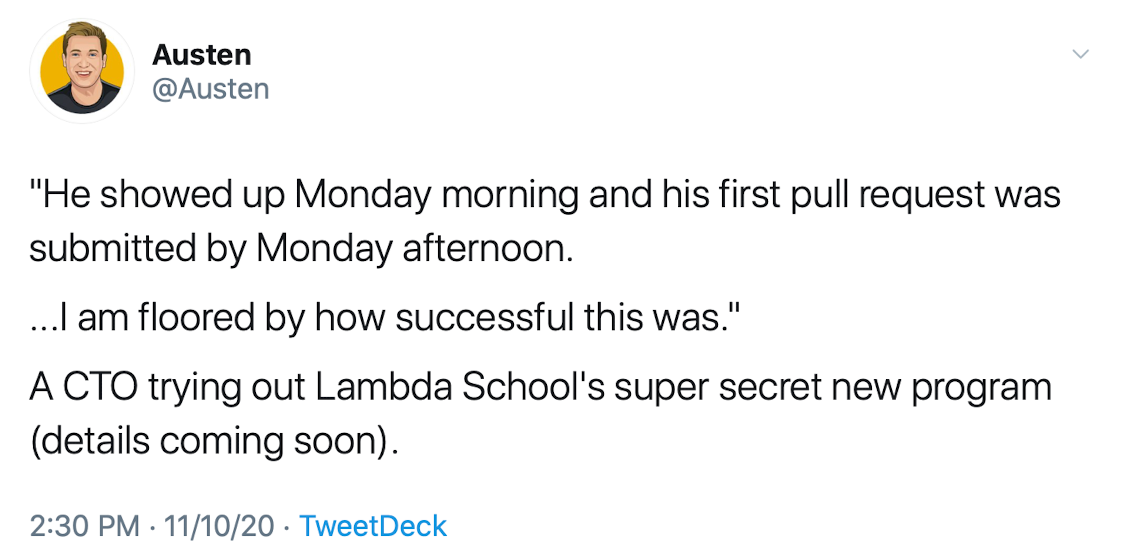
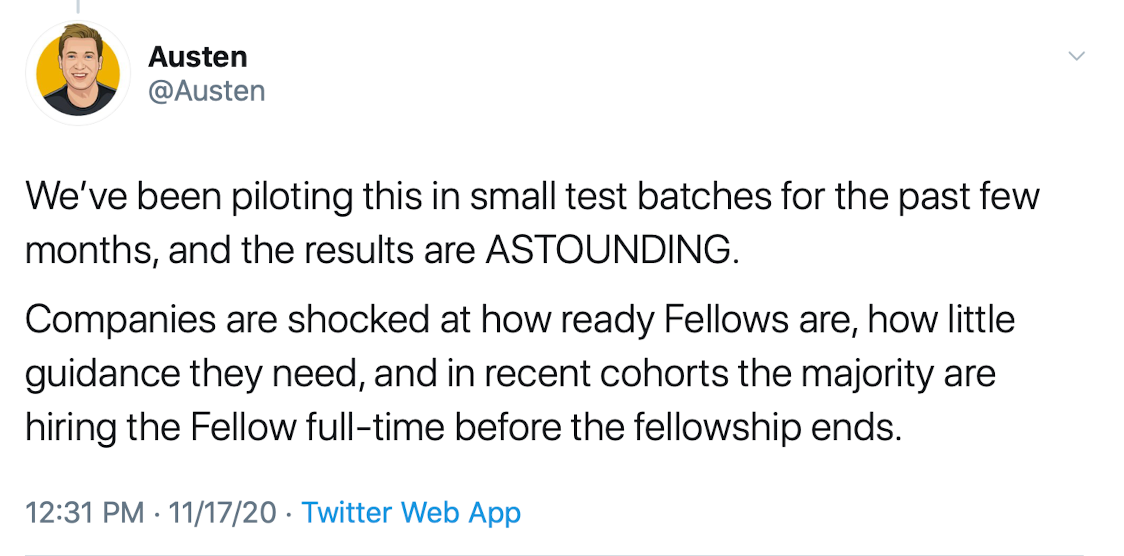
Austen bragging about the Fellows program, before its public launch and backlash.
Austen still claims he spent time homeless, but he wasn't actually homeless. At least not in the way most people think. When you hear "homeless," you probably imagine someone thrust into the spot due to mental illness, addiction, or domestic violence. Austen chose to camp out of his car to avoid paying rent while he pitched his first startup around Silicon Valley. Back in Utah, his annoyed fiancé and multi-millionaire parents waited with open arms. To Austen, homelessness was a fun personal challenge, like running a marathon or cutting out red meat.

He wrote on Quora:

Austen distorted his past to recruit students who were genuinely homeless. Jesse Horne first experienced homelessness at 17 years old, due to family issues and mental health problems. Austen replied on Hacker News, "Hi Jesse, I'm also formerly homeless…" before pitching him on Lambda School's latest innovation: a GoFundMe to send the homeless to Lambda School.
If Austen truly believes he was homeless, that might even be worse than just lying for publicity. If he lacks empathy for those genuinely struggling, it explains why he jumped to victim blaming when students brought up problems. To him, the system is never broken, you just aren't working hard enough. His "tuition refund guarantee" isn't misleading, because if you aren't ready to submit 400 job applications you just don't have what it takes to pull yourself up by your bootstraps.
I think Austen could have found success starting an MLM back in Utah, a state run rampant with get-rich-quick schemes. His mistake was going after education in California, a state ready to deal with for-profit schools. He wasn't ready for the law.
In 2019, California's BPPE fined Lambda School $75,000 and ordered them to cease operations. Like any for-profit school, Lambda needed to register with the state and wait for approval. They had never even registered and just operated illegally for the last two years.
Austen claimed the school had made an honest mistake, and that the company lawyer told them it didn't need approval since all the classes were online. Austen claimed the paperwork was filed, and told students, “The process takes time, but we’re working with [BPPE] to comply. There is no impact to students right now.”
Eight months later, on a hunch, I emailed the BPPE. They told me that Lambda School was not approved, had been ordered to shut down, and they were operating illegally. Austen sidestepped this issue with students because he didn't want students to know about an important California law: when a school operates illegally, the students don't owe it any money. All of those income share agreements were invalid. Despite this, Lambda School still went after graduates who shouldn't have had to pay.
The company struggled with California approval because ISAs existed in a legal gray area. In fact Lambda School spent $210,000 on Washington lobbyists in 2019 to try to straighten them out, to no avail. In 2020, Lambda School gave up offering ISAs in California, and they were quickly approved. But even bigger legal trouble was brewing.
Believe it or not, until January 1, 2021, there were no laws in California to protect consumers from a lie in Lambda School's contracts; the company claimed students they were taking on student loans that couldn't be discharged in bankruptcy, which was completely false. In January of 2021, AB 1864 went into effect, and California's financial protection bureau laid down the law.

Lambda School tried to underplay the settlement. They claimed that regulators had approved of the school, and merely asked them to remove a bit from the contract that was "not required." When California got wind of the spin, they issued a follow-up announcement calling out their bullshit.
The DFPI has received information that Lambda used potentially misleading marketing after executing its settlement with DFPI to resolve deceptive practices.
Lambda School recently published a public blog post that the DFPI believes could be misinterpreted by potential students or the public more generally.
…
Meanwhile, the uprising that destroyed Lambda School's subreddit boiled over into the real world, as students spread the word of The National Student Legal Defense Network (Student Defense), a legal non-profit that helps students trapped by predatory schools. Because students signed away their rights to a class action lawsuit as part of their enrollment agreement, the non-profit had to tackle arbitration on a case-by-case basis. The first three lawsuits landed in May 2021.

Lambda School quietly settled all eight cases so far, but this is a slow process. Student Defense thought they found a weakness in the anti-class-action provisions, after changes Lambda School made to their contracts in 2020. They filed a class action lawsuit in 2023, this time naming Austen Allred himself a defendant, in addition to the company.

Sadly, in January 2024, a judge ruled that the case had to go through arbitration. Austen, as usual, misrepresented what happened, claiming it as a win.

It felt like Austen would get away with everything. I couldn't believe that was the end of this story. What lesson have I learned watching this story unfold over the past five years? That you can get away with anything if you pick the right victims?
Two months later, the law finally caught up. In April 2024, the federal Consumer Financial Protection Bureau announced a settlement with both the company, and Austen individually. Both had tricked students with inflated job-placement rates, lied about selling loans to investors, and violated the Holder Rule. The CFPB decided that ISAs are just loans with hidden fees.
They banned Austen and Lambda School from engaging in student lending. Every student who had not found a job in the last year was released from their ISA. They fined the school itself a mere $64,000, and personally fined Austen $100,000.
Beyond the penalties, the ruling validated everyone that Austen gaslit over the years. The consent order spelled out every one of his lies.

But with all the money revolving around the company, isn't $100,000 just a slap on the wrist? While Austen likes to play the role of a successful entrepreneur, he claims he isn't rich.

Obviously he didn't have money going in, as his previous startups went nowhere, but what is this "secondary offering" thing?
Normally, a founder only gets rich when their company has an IPO or gets bought. When a startup grows as fast as Lambda School, sometimes investors allow the founders to sell a portion (say, 20%?) of their stock to outsiders, early. This is known as a secondary offering. Why? If the founder takes enough money off the table to become slightly rich, they feel less pressure to sell the company before it reaches its full potential.
However, if the founder truly believes in the future of their company, they'll use that cash to pay off taxes on the rest of their stock. Without getting too far in the weeds, that's like winning a hand at poker and going all-in on the next round. If that's really what happened, then Austen threw away millions of dollars.
Lambda School is now seven years old, an age when successful startups look to IPO. Surely his investors have given up and marked it as a loss on their balance sheets. At this point, any reasonable founder would wind down the company, brush themselves off, and start on their next venture.
Now up to its third layoff in three years, it seems Austen will do whatever it takes to keep the lights on. He would rather captain a ghost ship than admit defeat and move on. Why?
According to his book, Austen follows one thousand strangers on Twitter every day. Over a decade, this has amassed him 330,000 followers. But what has that ultimately achieved?
Follower counts are deceiving. Because of Twitter's longstanding "churn" problem, most followers of old accounts are inactive. When you gain followers by just following strangers, those followers are very low-value. They either followed back out of courtesy, or because they're bots planning to message you spam.
For example, Austen launched a YouTube channel last year. He repeatedly plugged it on Twitter, and even offered money to followers to help him cross 1,000 subscribers.

One year later, the channel sits at 866 subscribers. The videos themselves have a mere few hundreds views. Yes, Austen has a big follower count on Twitter, but that doesn't amount to much.
This speaks to the self-destructive cocktail that causes all his problems: an unhealthy relationship with social media, a pervasive grind mindset, and the need to distort reality.
Other unscrupulous bootcamps never face the scrutiny or Lambda School, and I'm certain that other startup CEOs commit crimes but never face personal charges. Austen wouldn't have faced consequences if he hadn't tweeted the smoking guns that took him down. He seems to care more about attention than success, like he'd rather be hated than forgotten.
Just as Lambda School sold the dream that anyone can get a job as a developer with a few months of grind, Austen was sold the dream if he just works enough hours, someday he'll become Elon Musk. But the world doesn't work like a Silicon Valley startup, and while the wheels of justice turn slowly, they grind exceedingly fine. Just as his victims couldn't afford a day in court, Austen finds himself in a similar situation, oblivious to the irony.

Austen has moved back to a small town in Utah. He's begun promoting his new side-hustle, a small venture capital fund, but he assures everyone that Lambda School is alive and well. They've pivoted into AI classes.
A few days before the consumer financial protection bureau fined him $100,000, he tweeted:

Maybe this is like his "100% hired" distortion. After all, five times zero is still zero. Or maybe he really believes it. Maybe the last person he's fooled is himself.